Study Trips
Japanese study trips by go go nihon.
An immersive travel experience, combining Japanese language lessons with authentic cultural experiences and engaging activities in Japan.
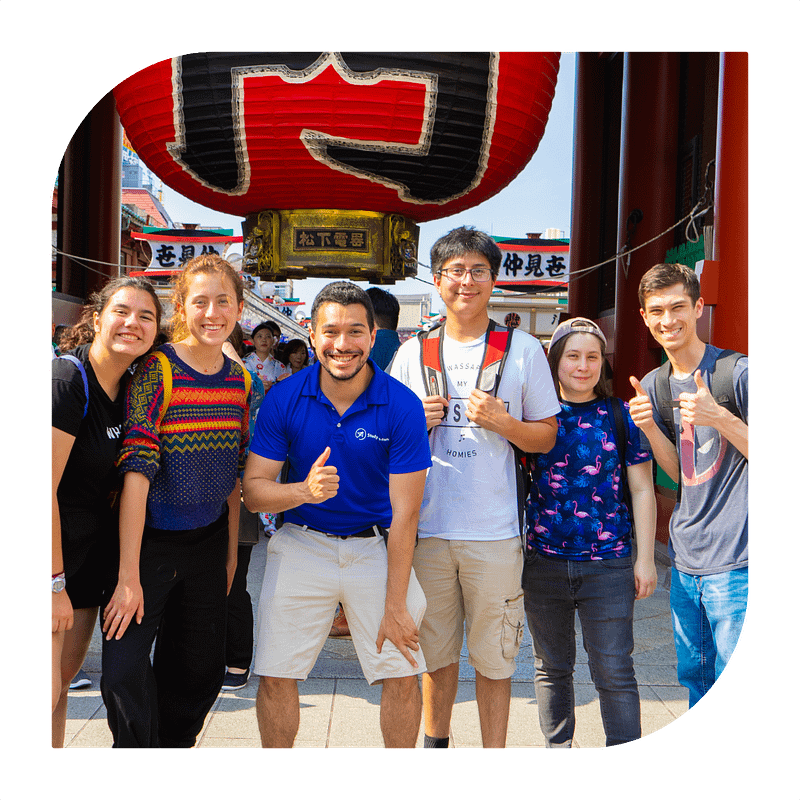
We partner with leading Japanese language schools to help you level up your Japanese skills.

Accommodation
We have a range of accommodation options, from fun share houses, cosy dorms to private hotel rooms.
Our activities are carefully chosen to give you a full experience of life, culture, and society in Japan.
GO! GO! NIHON
What is a study trip.
Study Trips by Go! Go! Nihon are your chance to live and study in a Japan for a short time, while experiencing the culture through a range of unique and fun activities. The trips last between two to four weeks and encompass your language lessons, cultural activities, and accommodation.
Our Japanese Study Trips are the perfect way to experience Japan, the language, and the culture in a short amount of time – a great option for those who can’t commit to learning at a language school long-term, or those who are looking for a more immersive experience.
Whether you’re interested in pop culture, traditional Japanese culture, Japan during the spring, or something else entirely, you’ll find a trip for you in our offerings. Experience a Japanese tea ceremony one day and visit the Ghibli Museum the next; or start your week stepping into a traditional yukata and finish it off with a karaoke session.
studytrip.com brings all our trips together so that you can pick the life-changing experience that’s right for you, simply choose the trip that suits you best.
Stress-free travel
Our experienced Study Trips team plans and organizes your entire experience, so you only need to worry about booking your flights. We take away the stress, so you can focus on immersing yourself in travel.
Make friends for life
Our Japanese Study Trips attract people from all over the world. Your fellow travelers will not only be immediate travel buddies, but you’ll leave Japan with global friendships and irreplaceable memories.
Awesome tour leaders
Our trip leaders are the best, if we do say so ourselves! They’re experts in Japanese culture and language, know all the best spots to visit, and will support you fully during your trip.
A taste of Japan life
Maybe you’ve thought about living in Japan, but aren’t sure if you’d like it? Study Trips are a fantastic way to see if living in Japan longer term is for you.
Japanese Study Trips
Study trip milestones, 50+ activities.
Immerse yourself in authentic Japanese culture
70+ Countries
Our travelers come from all over the world
9.1/10 Service
Our 700+ participants rate our service highly
9.4/10 Tour Leader
Study Trip travelers love our expert guides!
Go! Go! Nihon
Have more questions visit our faq page for more details..

Office hours: Monday-Friday 10:00-13:00 & 14:00-18:00 JST Telephone: +81 50 5357 5357
Normally, it takes us between 1 – 3 business days to respond to your email. Sometimes it takes us a bit longer, but don’t worry we’ll get back to you as soon as we can!
Subscribe to our newsletter
© 2024 株式会社GoGo World
🎌 Join our next Webinar!
Next session → Live Student Visa Consultation
Government-approved information site
- Bahasa Indonesia
Japan creates the future.
The future is what you create.
For prospective students
Search for schools
Search for schools by major, campus location, language of instruction, or other areas of interest.
Search for scholarships
Search for scholarships offered by schools, local governments, international exchange organizations, and private entities, as well as for tuition reductions and exemption programs offered independently by schools.
Useful information
Japanese Educational System
Universities (Undergraduate) and Junior Colleges
Graduate Schools
Japanese Language Institutes
Scholarships
Living Costs and Expenses
Part-Time Work
Employment in Japan
For Students

Prospective students

Current students

Support Measures for Ukrainian Students by Japanese Universities and Japanese Language Institutes
Announcement of Study in Japan official website renewal
Events for the people who want to work as Specified Skilled Worker (Immigration Services Agency of Japan)
Cool Japan Photo Contest for Foreigners 2023
JAPAN-UKRAINE UNIVERSITY PATHWAYS 2024 (external link)
JAPAN CAREER PROMOTION FORUM Central Eastern Europe 2023 (9/15)
Reasons to Choose Japan
The cultural heritage of mt. fuji, japanese cuisine, and much more; the spirit of omotenashi (hospitality).
Japan’s rich natural environments, from mountain forests to beaches and coastlines, offer all-new sights with the coming of each season. The country consists of eight major regions that each have their own distinct culture, traditions, and natural scenery. When selecting where you want to study in Japan, it would also be interesting to know about the regional uniqueness of each school’s location.


We use cookies to provide you with better services on our website. Please clink on "Agree" to agree and proceed. For more information and cookie settings, please click on “See Details”.
See Details
Promotion of Educational Travel to Japan
- ABOUT JAPAN EDUCATIONAL TRAVEL
- arrow_right WHY JAPAN?
- arrow_right Traditional culture
- arrow_right Modern culture
- arrow_right Natural environment
- arrow_right Japanese food
- arrow_right Sports
- arrow_right Made in Japan
- arrow_right Crisis management
- arrow_right Social systems and infrastructure
- arrow_right Peace and friendship
- arrow_right SCHOOL IN JAPAN
- arrow_right JAPANESE EDUCATIONAL SYSTEM
- arrow_right SCHOOL LIFE IN JAPAN
- arrow_right PLAN YOUR TRIP
- arrow_right SUGGESTED ITINERARIES
- arrow_right SCHOOL EXCHANGES
- arrow_right TIPS FOR A SUCCESSFUL ONLINE SCHOOL EXCHANGE
- arrow_right IN-PERSON EXCHANGES
- arrow_right ONLINE EXCHANGES
- arrow_right VISITOR'S VOICES
highlight ABOUT JAPAN EDUCATIONAL TRAVEL
Japan—rich culture and quality education makes it the best destination for educational travel.
What is Japan educational travel?
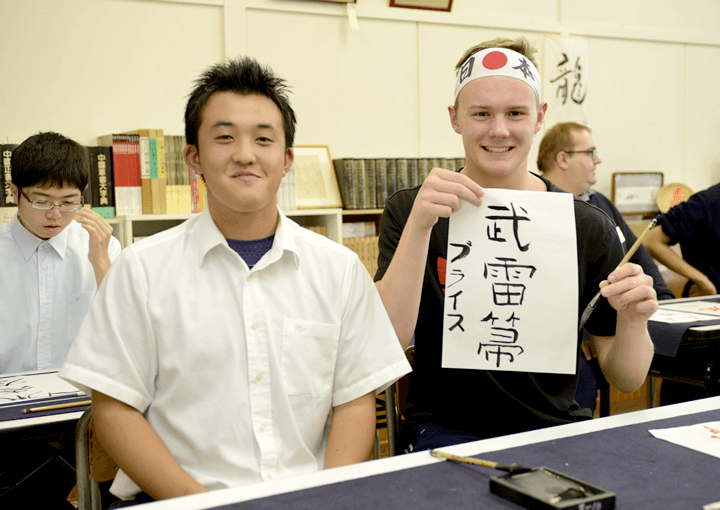
Educational travel refers to group tours organized by schools for their students with faculty members as group leaders. These trips have clear learning objectives and usually include visits to local schools, site visits, hands-on activities, and so much more. Japan has always been a popular destination for overseas educational travel, with its rich culture and abundant learning opportunities attracting students and schools from all over the world every year. Some students come to Japan to test out their Japanese skills by having authentic conversations with native speakers; some come to Japan to learn about the Japanese culture and the subtle nuances that textbooks cannot capture; some come to Japan to interact and share their ideas with students from another culture and to learn to appreciate the similarities and differences between cultures.
Four reasons why you should choose Japan as your destination for educational travel
The number of tourists visiting Japan has increased dramatically since 2012, surpassing 30 million per year in 2018. After overcoming the difficulties of COVID-19, Japan opened its doors to foreign travelers again in 2022. As a safe and secure destination, Japan is an ideal destination not only for recreational travel, but also for educational purposes.
1 Rich in history, culture, and natural scenery
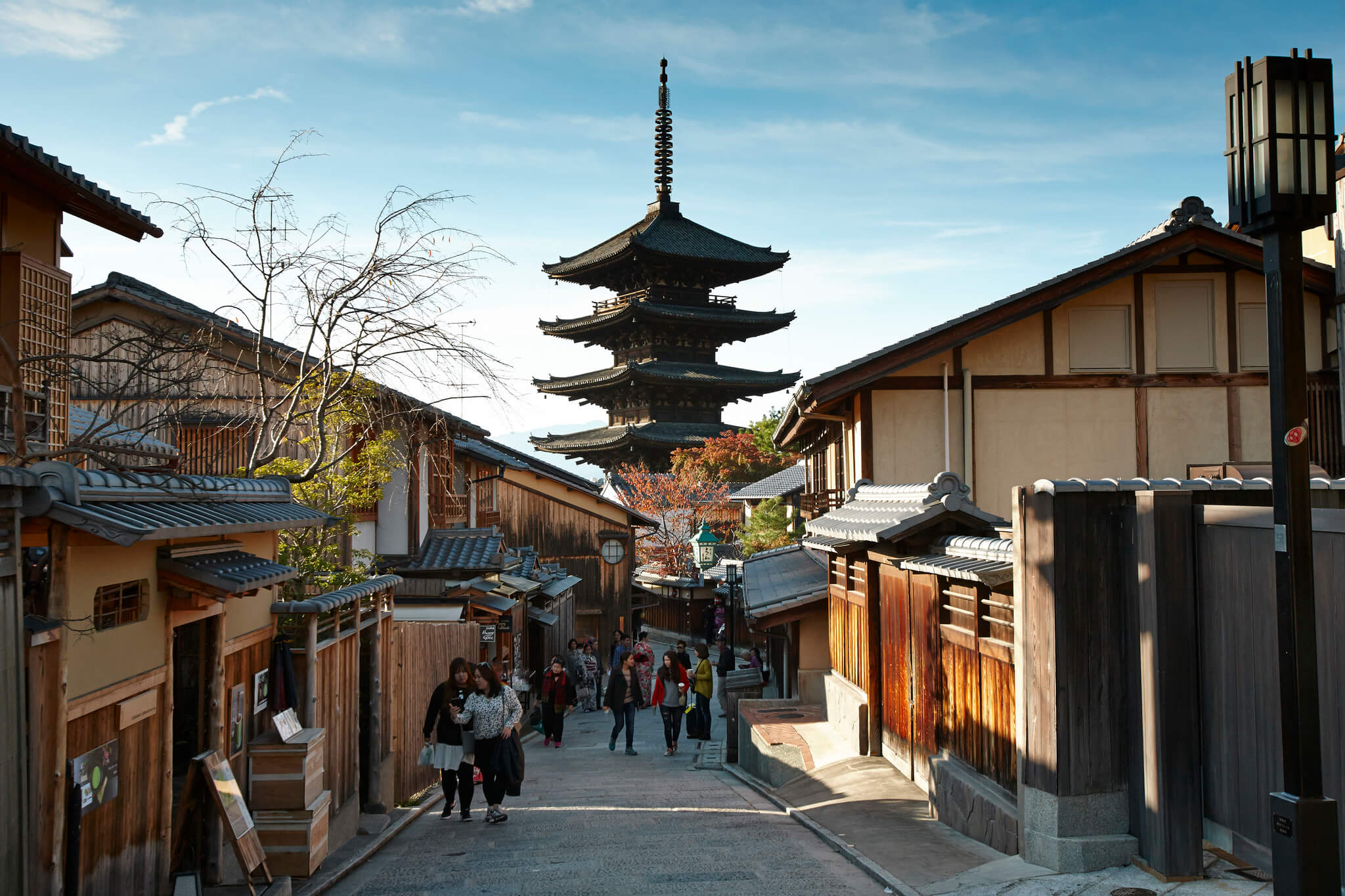
Japan has a long history and its culture is unlike any other. In the past, Japan was heavily influenced by Chinese culture. From its early-modern period (19thC), Japan started welcoming western influences such as western apparel and western cuisine. Through mindfully borrowing elements from other cultures and integrating them into Japanese culture, Japan has managed to reach a perfect balance between eastern and western cultures. Japan has absorbed the best of the west while simultaneously retaining its own unique Japanese culture and preserving uniquely Japanese concepts like “wabi-sabi”. Japan is an island nation made up of 4 main islands, spanning across different climate zones. Its distinct seasons and varied landscape has given rise to all sorts of beautiful natural scenery and traditional culture. For example, when cherry trees blossom in the spring, Japanese people will host “hanami” (flower viewing) gatherings where they have picnics under beautiful cherry trees with their friends and family.
2 High-quality and diverse education

In Japan, education is greatly valued and the country ranks among the best in the world in terms of quality of education. Japan is dedicated to encouraging and promoting both practical learning and academic research in various fields. Whether one wants to become a scholar, a pastry chef or even an anime graphic designer, Japan offers all the learning resources a student could possibly need. Japan educational travel offers many opportunities for students to visit local schools. Foreign students will be able to interact and make exchanges with Japanese students their age, sharing ideas and gaining global perspectives on different issues.
3 Rich and Diverse learning opportunities

Japan offers countless learning opportunities in history, culture, and nature outside the classroom. The Japanese government is dedicated to heritage preservation and 25 of Japan’s cultural and natural sites have been inscribed on the World Heritage List. By visiting Japan, students can experience in person unique aspects of world history rather than just reading about them in textbooks. Besides its impressive array of historical sites, Japan also boasts much cutting-edge technology. Japan is famous for its highly advanced industries. Students will have the chance to visit factories, observe their rigorous manufacturing processes, and in some cases even take part in hands-on activities. Another thing Japan is known for is its disaster prevention. Many people come to Japan to observe its comprehensive risk management procedures which have a proven record of successfully mitigating damage and casualties.
4 Safe and secure environment
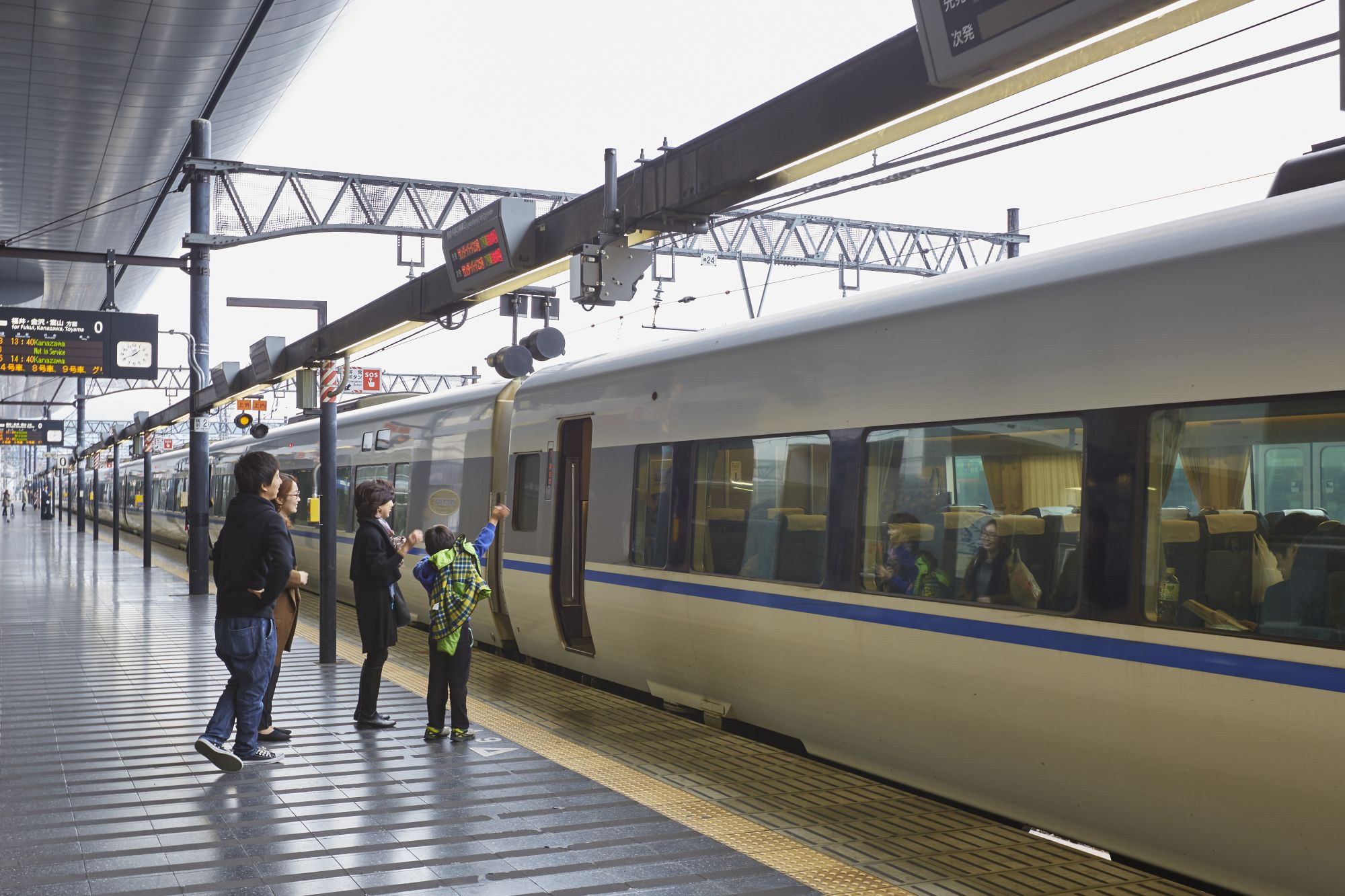
Japan is one of the safest countries in the world. Japan boasts one of the lowest crime rates in the world and its political environment is very stable. Being a developed country, Japan offers top-notch healthcare and the quality of this healthcare has been recognized by many prestigious organizations. Japan is often praised as one of the world’s cleanest countries and many cities in Japan have been ranked amongst the most livable cities in the world. Japan’s highly-developed public transit infrastructure makes it easy to get around the country. As a popular travel destination, Japan offers different kinds of accommodation at a variety of prices. You will surely be able to find one that suits your needs.
Educational travel in Japan
Japan is a popular destination for educational travel in Asia. In 2017, close to 40,000 people came to Japan for educational travel. More and more schools in Japan are taking part in educational travel and promoting international exchange in their schools.
Changes in the number of host schools for school exchange
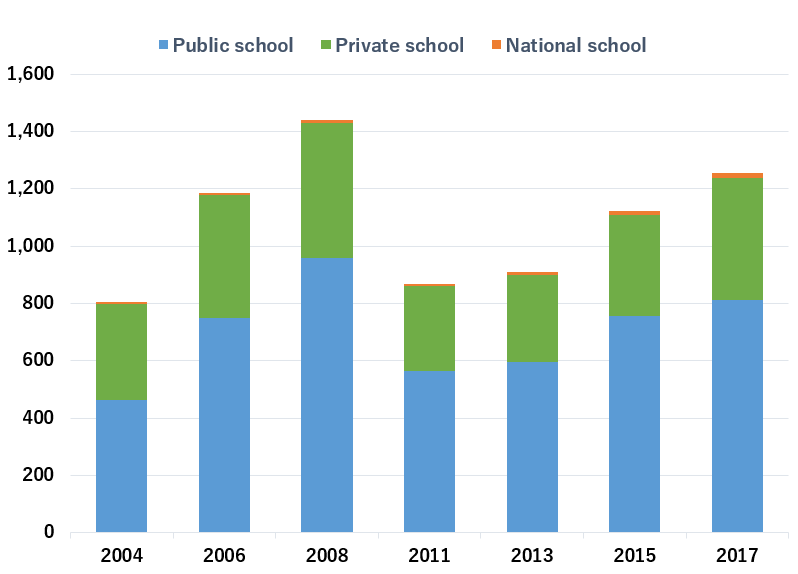
Changes in the number of visitors to Japan for educational travel by country / region
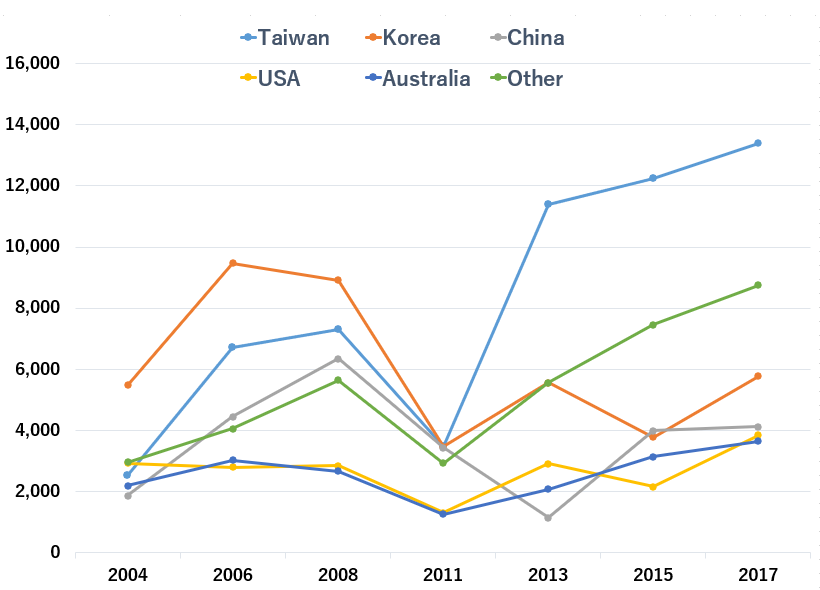
Source: Japan’s Ministry of Ministry of Education, Culture, Sports, Science and Technology
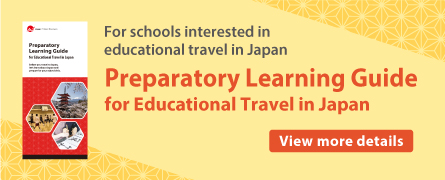
Related Information
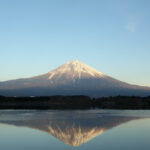
English 日本語 BOOK NOW
- Fukuoka Walks Facebook
- Fukuoka Walks Twitter

Japan Study Tour
Sample study tours.
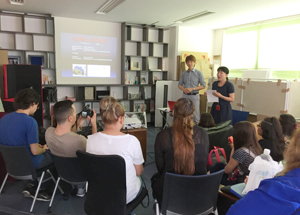
Privacy Overview

Practical Japanese Study Experience Tour in Tokyo
In the heart of Tokyo’s vibrant urban landscape, a unique blend of language study and cultural exploration awaits those seeking an immersive experience.
With a focus on practical Japanese application, this tour offers participants the chance to not only learn the language but also engage with the local community on a deeper level.
From traditional tea ceremonies to modern language exchange meetups, the itinerary is carefully curated to provide a well-rounded experience.
Interested in understanding how this tour can transform your Japanese language skills and cultural awareness? Stay tuned for insights into the enriching journey that lies ahead.
Quick Takeaways
- Engage in interactive language games and exchanges for practical learning.
- Immerse in cultural experiences like traditional crafts and local interactions.
- Learn transportation tips and explore Tokyo’s vibrant and serene spots.
- Utilize comprehensive study materials and native speaker interactions for language proficiency .
Tour Itinerary
Set out on an unforgettable exploration of Tokyo’s vibrant attractions with a comprehensive tour itinerary that promises an enriching cultural experience.
The tour kicks off with a delightful food exploration, where travelers can indulge in authentic Japanese cuisine at local eateries, savoring the rich flavors and unique culinary traditions of the region.
Following this gastronomic adventure, sightseeing adventures await , taking participants to iconic landmarks like the Senso-ji Temple in Asakusa, the bustling streets of Shibuya, and the serene gardens of the Imperial Palace.
Enjoy the bustling energy of Tokyo’s urban landscape while also finding moments of tranquility in its peaceful corners.
This tour itinerary offers a perfect blend of culinary delights and captivating sights, ensuring a memorable and immersive experience in this vibrant city.
Language Learning Activities
Explore the immersive language learning activities incorporated into the Tokyo study tour, enhancing participants’ cultural understanding through interactive linguistic experiences. Engaging in interactive games and language exchanges provides a dynamic environment for learners to practice Japanese in real-life situations. These activities not only improve language proficiency but also offer insights into Japanese customs and social norms. Participants are encouraged to converse with locals, enhancing their conversational skills and cultural awareness simultaneously.
Cultural Immersion Opportunities
Enjoy authentic cultural experiences that deepen your understanding of Japanese traditions and way of life during the Tokyo study tour.
Engage in language exchange sessions with locals, where you can practice speaking Japanese and gain insights into everyday communication.
Explore the art of traditional crafts by participating in hands-on activities like pottery making, calligraphy , or origami.
These immersive experiences offer a unique opportunity to connect with the rich cultural heritage of Japan and interact with its people on a personal level.
Local Transportation Tips
Navigating Tokyo’s local transportation system efficiently can greatly enhance your study experience, allowing you to seamlessly move between the city’s vibrant cultural sites and activities. When using public transportation in Tokyo, keep in mind the following tips:
- Metro Etiquette : Respect the local customs by standing on the left side of escalators.
- Bus Routes : Study the bus routes beforehand to avoid confusion and ensure you reach your destination promptly.
- Observe Quietness : Maintain a quiet demeanor while traveling on public transport to blend in with the locals.
- Stay Informed : Keep track of any service updates or delays to adjust your schedule accordingly.
Study Materials Provided
Enhancing your study experience in Tokyo, the tour provides comprehensive study materials to aid participants in their educational journey through the city’s vibrant cultural landscape.
The study materials include interactive exercises designed to engage learners actively and enhance their understanding of the Japanese language. These exercises cover various aspects of language learning, such as grammar , vocabulary , and sentence structure , to ensure a well-rounded study experience.
Plus, participants have the opportunity to practice conversational skills with native speakers, allowing them to apply their knowledge in real-life situations. By offering a combination of interactive exercises and conversation practice , the tour ensures that participants not only learn the language but also develop the confidence to communicate effectively in Japanese.
Participant Requirements
Participants must meet certain requirements to join the Japanese Study Experience Tour in Tokyo, ensuring a smooth and enjoyable educational journey through the city’s cultural landscape.
- Physical Fitness : The tour involves walking and exploring various sites, so participants should be able to walk moderate distances comfortably.
- Medical Conditions : To ensure everyone’s safety, individuals with serious medical conditions , especially heart problems , are advised not to participate.
- Reservation Punctuality : Being on time is crucial, as the tour may depart without latecomers to maintain the schedule.
- Operational Circumstances : Tour dates are subject to change based on operational requirements for a seamless experience.
Common questions
Are there any opportunities for participants to interact with local japanese students during the tour.
Opportunities for participants to interact with local Japanese students may enhance cultural exchange and language practice, fostering local connections for an immersive experience. This engagement can deepen understanding and provide unique insights during the tour.
Is There a Dress Code or Any Specific Clothing Recommendations for the Tour Activities?
There is no strict dress code for the tour, but participants should consider cultural norms . Dress comfortably and respectfully, avoiding overly revealing or offensive attire. Comfortable shoes are recommended as there might be walking involved.
Can Participants Request Specific Language Levels or Topics to Focus on During the Study Sessions?
Participants can request specific language proficiency levels and topics to focus on during the study sessions. Customized learning goals and study preferences can be accommodated to enhance the practical Japanese learning experience in Tokyo.
Are Meals Included in the Tour Package, or Are Participants Responsible for Their Own Food Expenses?
Participants are responsible for their food expenses during the tour. No meals are included in the package. This allows individuals to explore local cuisines, accommodating various dietary restrictions and offering cultural experiences through food.
Are There Any Recommended Additional Resources or Study Materials That Participants Can Utilize Before or After the Tour to Enhance Their Learning Experience?
For pre-tour preparation, participants can access online language learning platforms, Japanese language apps , and cultural study guides. Post-tour resources include language exchange meetups, online tutoring services , and continued practice through Japanese media consumption.
Enjoy the vibrant culture of Tokyo with our practical Japanese study tour. Explore the bustling streets and serene temples of this dynamic metropolis while enhancing your language skills and cultural understanding.
With a maximum of 12 travelers per tour, enjoy a personalized and intimate experience as you navigate Tokyo with ease.
Don’t miss out on this exciting opportunity to experience Japan in a whole new way!
Tokyo Trip Checklist
Similar posts.
![study tour in japanese [Regular Sightseeing Bus] World Heritage Shirakawa-go and Gokayama Ainokura](https://tokyo-top-guide.com/wp-content/uploads/regular-sightseeing-bus-world-heritage-shirakawa-go-and-gokayama-ainokura.jpg)
[Regular Sightseeing Bus] World Heritage Shirakawa-go and Gokayama Ainokura
The Regular Sightseeing Bus to World Heritage Shirakawa-go and Gokayama Ainokura is a highly recommended tour for those seeking a unique and memorable experience. This…
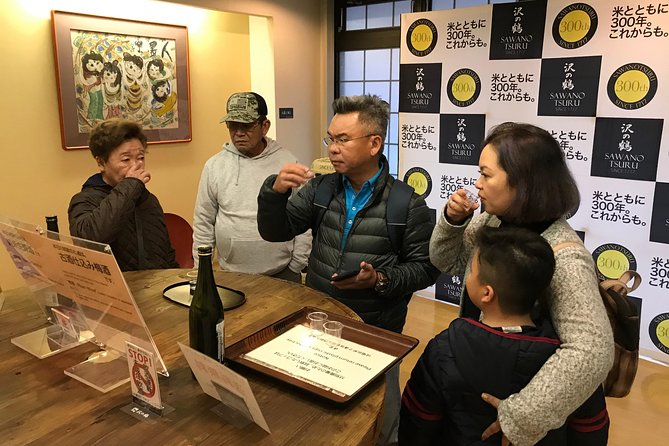
Private & Custom KOBE (HIMEJI CASTLE) Day Tour by Toyota COMMUTER (Max 13 Pax)
Step back in time and experience the allure of Kobe and Himeji Castle with the Private & Custom KOBE (HIMEJI CASTLE) Day Tour by Toyota…

Private Three-Hour Highlights Tour, Fujikawaguchiko
The Private Three-Hour Highlights Tour in Fujikawaguchiko offers a personalized and breathtaking experience of the region. Led by an English-speaking guide, visitors can explore natural…

Kyoto: Gion Night Walking Tour
Step into the enchanting world of Kyoto’s Gion district with the Gion Night Walking Tour. This thrilling adventure takes you on a captivating journey through…

Hokkaido Wild Experiences: Forest Adventure and Day Camp
In the heart of Hokkaido’s untamed wilderness, a tapestry of wild experiences awaits those seeking to unravel nature’s secrets and embrace its raw beauty. As…
Mt. Inunaki Trekking and Waterfall Training in Izumisano Osaka
In the realm of adventure seekers, the saying ‘The journey of a thousand miles begins with a single step’ holds true as they contemplate the…

Japan Trips
Choose your destination, study trips in japan.
Japan is often described as a country where old meets new in many different ways. This certainly stands true but there’s a lot more to it than tradition and technology. The culture that surrounds this country is diverse and seasonal. While this may seem like an odd description, the distinctions of the seasons and the delights that each one has to offer is unique to this amazing country. Whether it’s exploring the changing nature throughout the year from sakura in spring through to the momiji in autumn, or enjoying the seasonal food throughout the year.
Traditional activities are at the centre of a lot of our trips but they’re balanced with lots of cool cultural activities too. Whether you’re dying to try karaoke Japanese style or you want to explore the streets of Akihabara and get lost in an arcade for a day, there’s a chance to do all of them!
Find the Study Trip to Japan that suits you best!
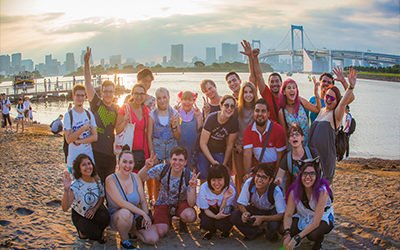
Summer Course
Book by June 3rd and
Get a 15,000 yen discount to celebrate Go! Go! Nihon's 15th anniversary!

Otaku Japan
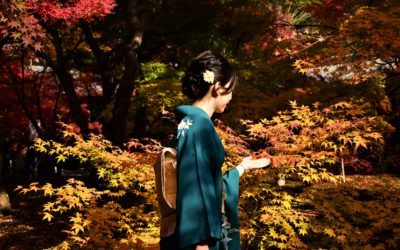
Autumn in Japan
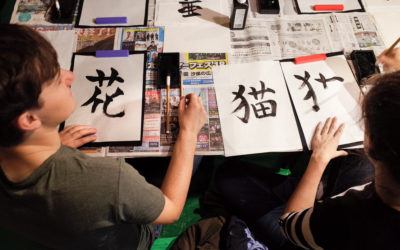
JLPT Study Trip – Winter

Winter in Japan
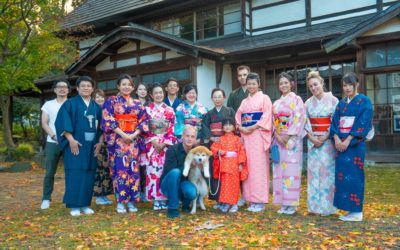
Akita Autumn Course – 3 weeks
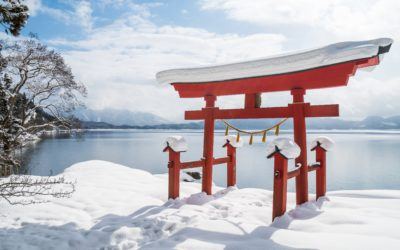
Akita Winter Course – 3 weeks

Spring Course
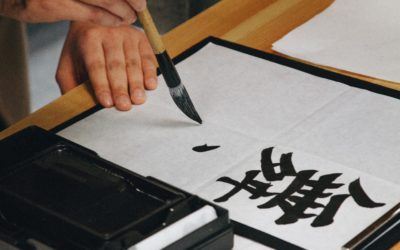
JLPT Study Trip
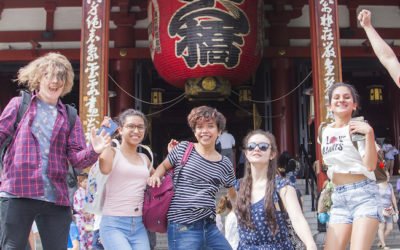
Youth Japan
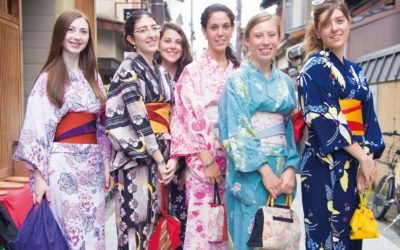
Traditional Japan
Japan is one of the safest countries in the world, with Tokyo and Osaka being in the top 3 of the 10 safest cities in the world.
Although mandatory to learn English in school, it’s not necessarily needed in Japan, meaning that fewer people use English on a regular basis. Only those who have the desire to learn or required to learn due to the trade they work. Although in comparison to other countries the level of English may be lower, you’ll be able to find people that speak English in Japan. If you need help with the language, Studytrip.com staff will be happy to help you!
Honshu, which is the main island of Japan can vary from north to south in terms of weather. This is also true from east to west with snow often falling in the west but not so in the east, where it’s milder. The most pleasant time to visit is in either the spring when the cherry blossom season begins, starting in the south and working it’s way up, or in the Autumn when the humidity, rain and heat start to subside and the autumn colours work their way down the country. In the far north you’ll find the island of Hokkaido famous for winter sports and to the southern tip the islands of Okinawa and it’s sub-tropical weather, the weather in Japan offers distinctive seasons which means theres something for everyone.
Spring is possibly the most popular time to visit with beautiful cherry blossoms and pleasant weather. Autumn is also a favourite due to the warm but not humid temperatures and the autumn leaves. Winter, whilst cold, offers great conditions for winter sports and snow festivals and finally the summer months, although they can be rainy and very humid, tourist areas are generally quieter and there are tonnes of fun festivals and firework displays to enjoy.
There are many countries and regions that have visa exemption arrangements with Japan. This allows nationals to enter Japan without the need of a visa for short stays. For more information about the period of stay allowed and whether your country is exempt, please get in contact with us.
Yes, there are plenty of vegetarian options in Japan but it’s best to do some research before coming, as not all restaurants have vegetarian options. It’s also easy to get caught out by simple ingredients used in every day cooking, such as dashi, a type of stock or bouillon, which is typically made from fish.
Yes, you can use your mobile phone in Japan, but be careful as not all phones work on the frequencies used here, also be sure to turn data roaming off if you want to avoid hefty fees from your provider back home. Internet is not widely available in public spaces, so that’s why we recommend pocket WiFi. You can book yours when applying for your trip and you can even connect up to 10 devices!
We have our own highly knowledgable, qualified, multilingual and multinational local staff who act as guides, translate, and provide general support for during the trip, to ensure everyone has the best possible experience.
With most of our trips travel insurance is already included. You can find out more information here . For a small number of our trips that does not automatically include travel insurance, it is still possible to choose this as an option when booking. For those that do not select the travel insurance when booking individuals should book their own. Travel insurance is very much an essential and necessary part of travelling.
Meals are typically not included unless noted on the course page or as part of an activity, like the izakaya dinner. Please ask our staff if you have questions about your specific course.
Japan’s public transportation network is extremely convenient and reliable. We recommend using a Prepaid IC card to avoid having to buy tickets for every trip. You can also use them at certain stores and vending machines, and can easily re-charge them at stations.
Most major international credit, debit, and even some pre-paid cards are accepted in Japan. But note that some smaller businesses only accept cash in local currency.
The #1 app for getting around in Japan is Google Maps. For translation, #2 is Google Translate for speech, writing, and photos. The #3 app that will help you find the best eats in the country is GuruNavi.
Yes, as long as you have an attendance rate of 90% or more you will receive a certificate at the end of the course.
Username or E-mail
Remember Me
- Lost Password
Study Abroad in Tokyo

What to Expect in Tokyo
Study abroad in Tokyo to experience Japanese culture and have the adventure of a lifetime.
Explore centuries-old temples, gardens, and castles that are only minutes from ultra-modern skyscrapers, electronics stores, and haute couture fashion centers. Dine on sushi and tempura, attend a sumo match or a baseball game, and learn tea ceremony, karate, or breakdancing. The Tokyo study abroad experience has something for everyone.
Explore this bustling metropolis as you take classes in the town of Makuhari, on the tip of Tokyo Bay, and just 45 minutes from the heart of the city.
Immersive courses, exciting excursions, and so much more awaits when you study in Tokyo!
Our Programs
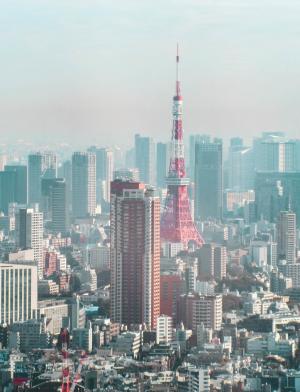
Tokyo - Language & Culture
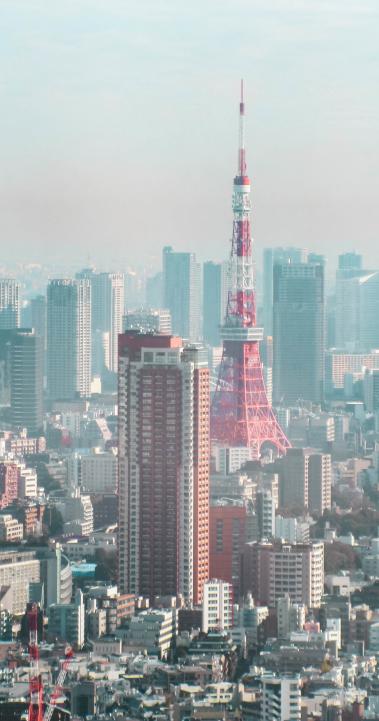
Tokyo, Japan
Language & culture.
Tea ceremonies, calligraphy, music, dance, and martial arts—Japan is a medley of culture, old and new, that you can explore during your time in Tokyo. Live and learn in this exciting city where the past mingles with the future, and the ultra-modern stands side-by-side with the...
Spring 2025
Language of instruction:, language prerequisites:, visa required:.

Tokyo Summer

Tokyo will challenge you to experience the world in new ways, and immerse yourself in a culture that combines fast-paced modernity with age-old traditions. This program is excellent for serious students at all levels who seek to study Japanese language in an intensive 6-credit course...
Top 5 Things to Do in Tokyo
About the ies abroad center.
The Center is where our highly trained local staff provide on-the-ground support throughout your time abroad.
The IES Abroad Tokyo Center is located in Makuhari, a modern city in Chiba prefecture, which is in the Greater Tokyo Area. Easily accessible by public transportation, the Center is your study abroad hub.
IES Abroad Tokyo Staff

Caleb Foale
Ies abroad tokyo center director.

Mariko Ishikawa
Field placement program, homestay & customized programs coordinator.
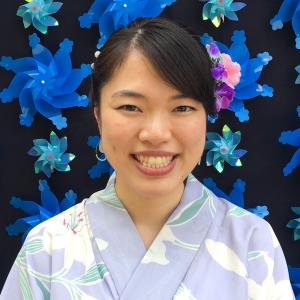
Risa Katori
Student affairs coordinator.

Hyung-Hye Lee
Student affairs manager.
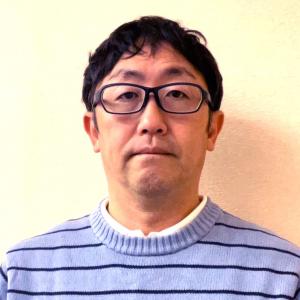
Associate Director

Natsuko Takahashi
Administrative assistant.

Theresa Wanner
Student success coordinator, health & safety.
With 70 years of experience, we are proud to set the standard for health and safety in study abroad. Our Chicago-based and on-site staff are all highly trained and experienced in the matters of health, safety, and crisis management. We are here for you from predeparture to your return, and are ready to support you—no matter which time zone you’re in. We plan for "what ifs" so that you don’t have to. From international health insurance included in the cost of your program to highly-trained local staff who can connect you to English-speaking healthcare providers, we are working around the clock to ensure your health and safety while abroad.
Support You Can Expect to Receive on Our Programs
In the case you need to see a doctor or mental health professional.
Whether you encounter an issue while traveling or in your host city.
Receive any emergency updates from IES Abroad staff via call or text.
Health and safety information presented at orientation by on-site staff.
Allowing you to share independent travel plans.
So that you feel prepared to respond to an emergency should one arise.
Helpful Links
Apply for your passport today.
Getting your passport is a crucial step for studying abroad. With processing times taking longer than usual, consider this a gentle reminder to not procrastinate on getting or renewing your passport.

The Student Experience

My Time in Berlin: A Digital Scrapbook
A collection of my favorite moments and memories from my time in Berlin.

Data in Deutschland #0: The Journey Begins
This is my pre-departure thoughts and feeling about my internship this summer, along with my plan for my blog series, Data in Deutschland.

Reflecting on my time in Siena
My reflections from my time in Siena.
Student Ambassadors
No one knows the IES Abroad experience better than a student who has lived it! From budget tips to housing experiences, our volunteer Ambassadors are here to share it all.

Latest from Tokyo
Follow @IESabroad on all your favorite social media platforms for the latest videos, photos, blog posts, and updates from our students and staff around the world.
IES Abroad News

Continuing Our Journey: IES Global

SooMin Hwangbo on Study Abroad and Social Media
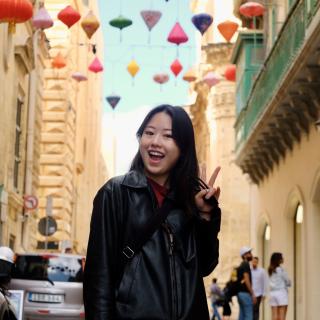
Celebrating OpportunitIES Abroad with our AAPI Correspondents

4 Almonds Abroad: A Family’s Global Odyssey
Want to study abroad in tokyo.
How will studying abroad in Tokyo redefine your world? We can’t wait to find out.
Volunteers in Asia
- Our Mission
- Join Our Team
- Alumni Events
- Alumni Spotlight
- Alumni News
- Publications
- Social Networking
- Harassment Policy Statement
- Privacy & Cookie Policies
- Application Instructions
- Timeline & Finances
- Regional Posts
- Frequently Asked Questions
- Testimonials
- 2023-2024 Fellows
- 2022-2023 Fellows
- 2019-2020 Fellows
- 2018-2019 Fellows
- 2017-2018 Fellows
- 2016-2017 Fellows
- Rikuzentakata Project (Japan)
- Nichibei Girls Collaborative FAQ
- Japan Study Tour (Kyoto | Nara | Tokyo)
- Discovering Culture & Health Care
- Medical Programs FAQ
- Social Innovation Programs FAQ
Application
- Cost & Funding Opportunities
- Accelerator FAQ
- Course Timeline
- Facilitator Team
- Past Cohorts & Participants
- Enlight Project Grants
- Expand your Boundaries
Japan Study Tour
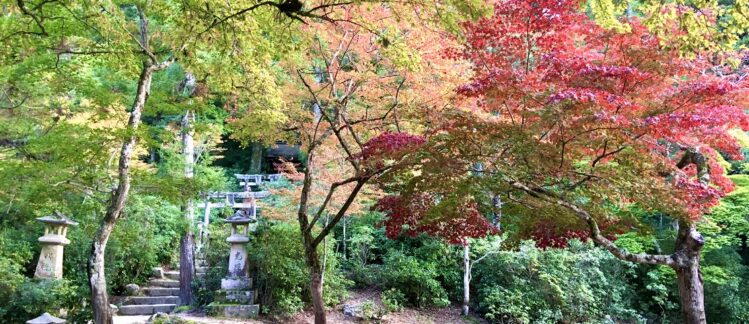
Join VIA’s Executive Director, Kazutoh Ishida, along with other VIA alumni, family, and friends for a one-of-a-kind study tour in the Kansai and Kanto regions of Japan!
The tour will include site visits to ancient capitals Kyoto and Nara, as well as Koyasan where VIA used to hold our volunteer trainings, and Tokyo. Highlights of the trip include visiting historical sites such as Fushimi Inari Shrine , Kinkakuji (Golden Pavilion), Todaiji Temple , and Asakusa ; experiencing traditional Japanese culture; learning about current social issues; visiting VIA’s partner schools; and meeting with VIA supporters and alumni.
Meet the Trip Leader
Tour registration.
Continue reading below to learn more about the tour, or click the blue APPLY button if you’re ready to register. After clicking the APPLY button, you will be taken to the registration portal to create a user account. This will allow you to save your progress and return to continue your application at any time.
Click on the section headings or ( + ) circles below to view more content:
Cost & Travel Information
Participation costs.
The $4,900 program fee covers items listed below and also includes a non-refundable, tax-deductible $500 donation to VIA.
Please note that VIA does not currently offer registration fee discounts and/or travel funding for study tours.
Costs included:
- Domestic travel within Japan
- Lodging will be arranged for two participants per room
- $500 additional fee for private room for duration of the trip
- Special accommodations can be arranged for families traveling with children (submit details in your registration form)
- Some group meals
- Most entry fees, guided services, organization and site visits
Costs Not Included:
- We recommend booking flights to arrive at Kansai International Airport (KIX) on October 4th by 12:00 PM and to depart from Haneda International Airport (HND) or Narita International Airport (NRT) in Tokyo on October 13th or later.
- Visa fees, if applicable (US passport holders do not need a visa to enter Japan)
- Admission to some historical landmarks and cultural sites (est. $150)
- Some meals (est. $200-300 per person)
- Shopping and other personal expenses
- Travel and medical insurance (est. $30-70)*
*Travel & Medical Insurance Coverage
We require all participants to maintain health insurance coverage while traveling abroad. Please check with your insurance provider to understand what coverage you may or may not have while overseas. You can choose to enroll in your own insurance plan and provide proof of coverage. VIA can also arrange comprehensive travel health insurance coverage for US citizens through iNext’s Comprehensive Ultimate Plan with Standard Political & Natural Disaster coverage at an additional cost ( see policy details ).
If you choose this option, you will be enrolled for the minimum 11-day period (October 3-13, to allow for transit time), at an additional cost of $28.65 for travelers 60 and under or $67.81 for travelers over 60 years old. You will have the option to purchase additional Trip Cancellation & Trip Interruption coverage and/or extend your travel dates after initial enrollment.
Personal Health Expenses
Participants are responsible for any medical testing, care, or additional travel costs associated with infection and treatment, including, but not limited to, the cost of modifying, extending, or cancelling any lodging or transportation arrangements before, during, or after the program.
Registration Fee Payment & Cancellation Policies
Invoice & Payment Deadline
After VIA confirms your registration details, you will receive an invoice from VIA’s finance department with instructions to complete the payment in early July.
Deposit: A $500 non-refundable deposit is due within one week of the invoice issue date. You will receive a receipt for this amount as your tax-deductible donation.
Complete Payment: Full payment is due 30 days from the invoice issue date. If your invoice is issued 30 days or less before the tour start date, full payment is due when you receive the invoice.
Participant Cancellation
VIA will return 50% of the registration fee, less the deposit, if your cancellation is confirmed at least 30 days before the program start date. If you cancel less than 30 days before the program, we are unable to refund your registration fee. Partial refunds will be considered in extenuating circumstances.
Tour Modification or Cancellation
VIA may cancel the tour at any time prior to or during the tour if travel and in-person activities are not possible due to natural disasters, including pandemics. You will receive a full refund if the tour is canceled at any time prior to the tour start date, less the deposit.
Travel Tips
- We strongly encourage participants to pack and travel lightly as the group will be making several trips to different cities across Japan. We recommend one suitcase that you can manage to carry around a residential block and up/down a flight of stairs. Not all public transit stops have elevators.
- Dressing modestly, such as at least knee-length skirts / shorts, long pants, and shirts covering your shoulders, is recommended to be respectful of the local culture, especially during visits to cultural heritage and religious sites.
- Temperatures can vary between about mid-50s to mid-70s (fahrenheit) in the fall in Japan, with some rain expected, so bring clothes that you can layer and a light rain jacket and/or umbrella.
- Please bring cash to exchange and/or bank cards that can be used to withdraw cash internationally.
- Prescription and over-the-counter medicines you take regularly (check customs regulations if you are concerned about the type or quantity allowed)
- Sunscreen, sun protection (sunglasses, hats)
- Comfortable walking shoes
- Optionally, a pair of shoes to wear indoors only (usually slippers are available)
- Travel documents (passport, identification, insurance policy info)
Additional travel preparation instructions will be provided to all registered participants in September.
Tour Itinerary
The study tour itinerary is subject to change any time before or during the tour. Additional details will be added as scheduled activities are confirmed. Participants are welcome to arrive before the tour start dates or continue their travels after the tour ends.
Note: There will be an online pre-departure briefing in September.
Registration Process
Before beginning your registration form, you will be prompted to create a user account. This will allow you to save your progress and return to continue or make changes to your registration form, even after submission.
You may register up to five individuals at once. We recommend registering multiple people if you would like to pay all registration fees for members of your party together. If you prefer to pay separately, we recommend registering separately.
Please be prepared to provide the following information for each member of your party:
- Passport information
- Emergency contact information (can be the same for all travelers)
- Health information (allergies, immunizations, medications / medical conditions, dietary restrictions, mobility considerations, travel medical insurance preferences)
- Accommodation preferences (single or shared)
After Registering
You will receive a confirmation email with instructions for next steps, including completing VIA’s Risk Notice & Acknowledgement Form and providing proof of insurance (if not enrolling in iNext). We appreciate your prompt completion of these final steps of the registration process.
After our staff review your registration, they will reach out if they have any questions about your travel arrangements before our finance department issues your invoice (by early July).
- The tour is an opportunity for VIA alumni to reconnect with the community and current participants, meet social impact leaders and organizations currently working with VIA in Japan, and learn about VIA’s new social impact and leadership development initiatives.
- The tour will start in Kyoto, visit Nara, and conclude in Tokyo.
- 10 days, inclusive of arrival on October 4th through October 13th. Participants may determine their travel plans after checking out of the hotel in Tokyo on October 13th.
- Yes, spouses / partners, children, family, and friends of VIA alumni are welcome to join the tour!
- There is a registration fee for the tour, as well as other costs not included in the registration fee participants must cover. There is no funding support or discounts for registrants.
- We are expecting anywhere between 10 – 15 participants joining the tour.

Join this unique opportunity to learn more about studying and researching in Japan. Representatives from many Japanese universities will introduce their programs, admission processes, scholarship opportunities, student life, and much more!
This fair is organized by Osaka University under the "Virtual Tour for Prospective International Students from Diverse Cultures and Languages" Project, which is part of the Top Global University Japan Project of the Ministry of Education, Culture, Sports, Science and Technology. The participating institutions are members of the Japan Forum for the Internationalization of Universities (JFIU).
College Study Abroad
- Study Abroad Locations
Study Abroad in Tokyo
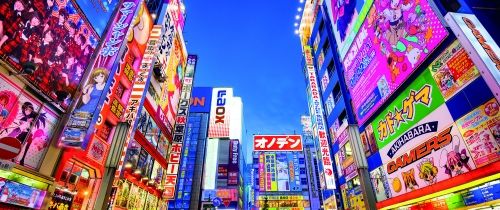
Explore Tokyo, Japan
Japan’s bustling capital city is renowned for its nightlife, shopping, public transportation, and cleanliness. Perhaps because of its mix of ultramodern and traditional, Tokyo also earns high marks for being a wonderful place for university students to study abroad in Asia.
When you study abroad in Tokyo, you’ll immerse yourself in the lively and fascinating culture of Japan. Known for its iconic landmarks, modern architecture, and technology, Tokyo is Asia’s largest metropolis with much to explore!
EXPLORE TOKYO PROGRAMS
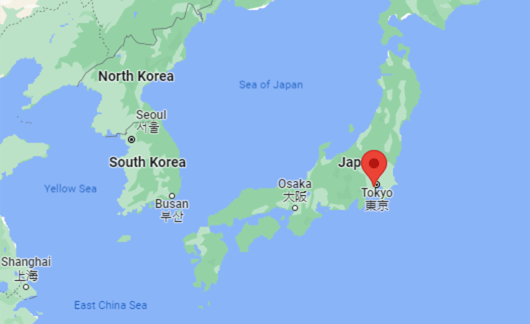
Study Tours & Cultural Excursions in Tokyo
Every CIEE semester program has frequent cultural excursions and a multi-day study tour uniquely designed to complement the program’s academics and enhance students’ cultural immersion. In Tokyo, past study tours and excursions have included:
- Weekend trips to Hiroshima to visit the Hiroshima Peace Memorial Museum
- Visits to the sacred Miyajima Island, a UNESCO World Heritage site home to the Itsukushima Shinto Shrine
- Set out across the 918-m-long-single-span suspension bridge to Odaiba
- Weekend excursions to other regions in Japan, including Sendai, Kansai, or Nagano
- Visit the Tokyo Dome to experience a variety of events, including baseball games, concerts, mixed martial arts events, and more
CIEE’s study tours and cultural excursions in Tokyo, Japan give students the opportunity to learn more about Japanese culture, all while building their Japanese language skills. Whether you’re interested in studying music abroad in Japan, looking to learn Japanese, or explore Tokyo’s history and culture, CIEE’s study abroad programs in Tokyo allow you to do just that!
About the Center
Situated in Chiyoda City, a special ward in the heart of Tokyo, CIEE Tokyo features a student lounge, library, student life office, academic advising office, and complimentary WiFi and printer access. The Center is conveniently located near subway stations, making it a prime spot to travel to other parts of the city easily.
Beyond CIEE Tokyo, students can explore some of Japan's most important landmarks, like the Imperial Palace, the prime minister's office, and the supreme court. The city also offers plenty of amenities, like shops, restaurants, and cafés.
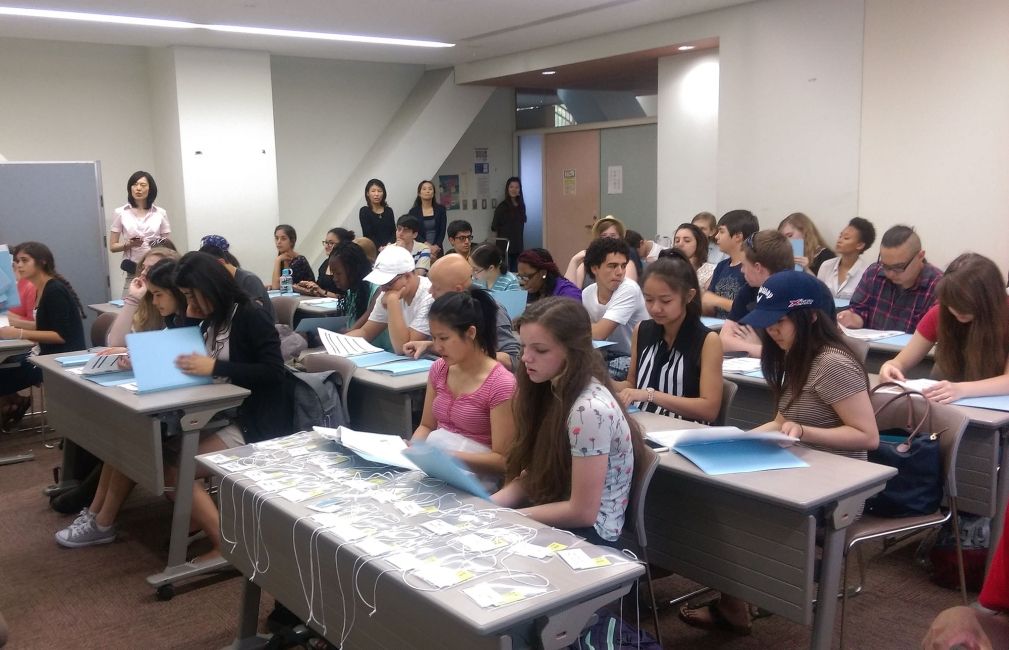
Where Students Study
CIEE Tokyo CIEE Tokyo is located in Chiyoda City, a special ward in the heart of Tokyo.
Sophia University Founded by Jesuits in 1913, Sophia University is one of the leading universities in Tokyo. It welcomes more than 13,000 students, including international students from more than 90 countries. In addition to Japanese language courses, CIEE students will take courses through the Faculty of Liberal Arts.
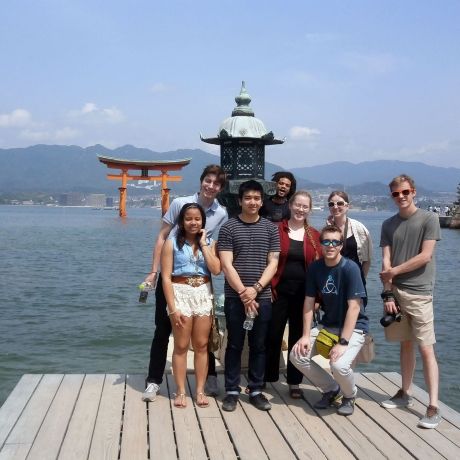
Internships & Volunteering
Depending on their program of study and availability, students may be able to participate in an internship or volunteer in Tokyo. Students interested in interning in Tokyo can take advantage of non-credit internship opportunities at a variety of businesses or NGOs.
Students looking to volunteer in Tokyo can help out local schools, collect food for the homeless, or volunteer to support disabled youth.
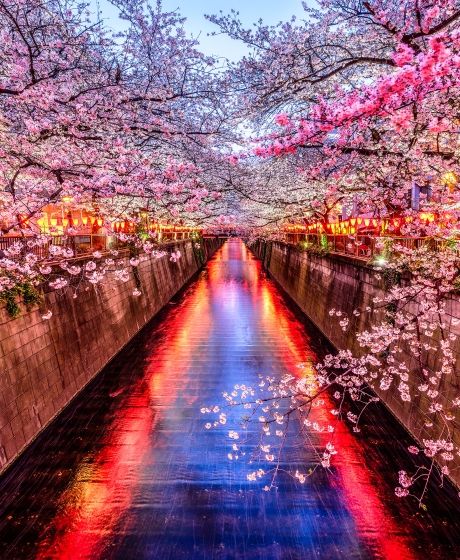
NEW PROGRAM COMING SOON
- Semester in Tokyo (fall 2025)
Study Abroad Programs in Tokyo
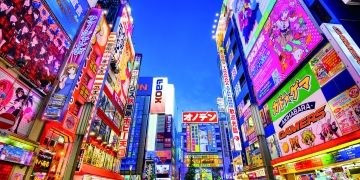
- Tokyo, Japan
Summer Global Internship
- Study Program
- Full-Time Internship
Experience international business firsthand in Asia’s largest metropolis.
- Bike Friendly
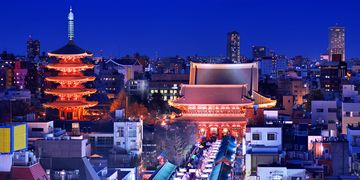
January in Tokyo
Ring in the New Year and spend your winter break in Tokyo, Japan’s vibrant capital city.

Summer Japanese Studies
Spend your summer exploring Japanese language and culture
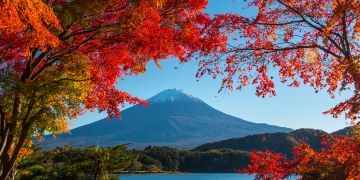
Arts +Sciences
You’ve got one amazing global adventure
- Host Institution
- Volunteering
Currency Yen
Spoken Languages IN Tokyo Japanese, English
Available Transportation Subway, train, bus
Famous Local Hayao Miyazaki – famous Anime director known for Spirited Away and My Neighbor Totoro
Climate Humid subtropical climate with warm summers and mild winters with an average annual temperature of 62° F
Local Attraction Tokyo Imperial Palace – the residence of Tokyo’s Imperial Family
Did you Know The cherry blossom is Japan's unofficial national flower
Airport Haneda Airport (HND)
Social Norms Slurping noodles is perfectly acceptable – it’s actually the proper way to eat ramen!
What to Pack Comfortable shoes, toiletries, passport
Frequently Asked Questions
Tokyo is known for its iconic landmarks, Anime, electronics, manga, and video games, to name a few. Famous attractions in Tokyo include the Meiji Jingu Shrine, Tokyo Skytree, Shibuya Crossing, and Tokyo Tower, making it a unique place to study abroad for students interested in history, media, Japanese, and so much more!
Read more: Study Abroad in Japan: FAQs
If you’re wondering, “How can I study in Japan?” CIEE’s program offerings in Tokyo and Kyoto allow you to do just that. By simply selecting your study abroad program in Japan, connecting with your on-campus study abroad office, and filling out your application, you can explore Japan on a CIEE study abroad program.
Tokyo, although crowded with a population of over 13 million, is regarded as a clean, safe, and exciting city. With a wide variety of shopping and entertainment options across the city, Tokyo is a vibrant city for students looking to immerse themselves in Japanese culture, history, and language.
For students studying abroad in Tokyo, we recommend that they get acquainted with the city’s public transportation system, and learn and use as much Japanese language as possible.
In order to ensure our students feel welcomed, supported, and empowered while studying abroad, CIEE staff completes comprehensive diversity equity and inclusion (DEI) training. Staff provide students with advice, resources, and ongoing support both before and during their study abroad program in Tokyo. For more detailed information on diversity in Tokyo, visit our Diversity in Tokyo page.
The cost of studying abroad in Tokyo varies depending on the specific program that you choose and how long you plan to study abroad for. For detailed cost information, we recommend researching each individual Tokyo study abroad program page.
For costs not included in your program’s outlined fees, it’s important to consider factors surrounding your individual journey while abroad.
Read more: How Much Does it Cost to Study Abroad?
Study Abroad Scholarships & Grants

Apply in 1,2,3!
You may be wondering if there are any scholarships to study in Tokyo. CIEE offers scholarships and grants for study abroad programs in Tokyo to students with demonstrated financial need, proven academic merit, and for specific CIEE programs. Students can apply for scholarships through 3 simple steps:
- Search for and apply to your dream program
- Review all available funding opportunities
- Complete the Scholarship & Grants portion of your application
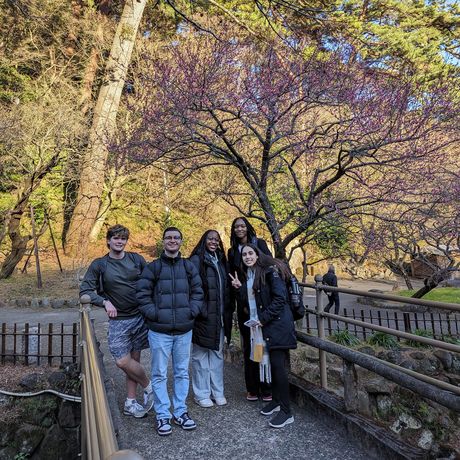
Study Abroad Scholarships
Need-based scholarships.
Based on students' Estimated Family Contribution (EFC) from their Free Application for Federal Student Aid (FAFSA) and enrolled institution. Complete the Scholarships & Grants portion of your program application to be considered for all awards to which you are eligible.
MERIT SCHOLARSHIPS
Based on academic achievement. Complete the Scholarships & Grants portion of your program application , along with an essay, to be considered for all awards to which you are eligible.

OTHER SCHOLARSHIPS
Other scholarship awards are based on program or alumni status.
VIEW OUR SCHOLARSHIPS & GRANTS
CIEE Tokyo on Instagram
Tokyo study abroad blog.

Study Abroad in Japan: FAQs
If you’re about to embark on a study abroad adventure to Japan or considering this fascinating country a study abroad option, read on as we dive into some of our... keep reading
- Activities & Excursions
- Best Time to Study Abroad
- Foreign Language
- Misconceptions

7 Best Japan Study Abroad Programs
Passionate about ancient history, a diverse culture, modern advancements, and incredible natural landscapes? Then a study abroad adventure in Japan is the perfect opportunity for you. Read on as we... keep reading
- Architecture

How to Study Abroad in Japan: 4 Simple Steps
Japan is an extraordinary country – one of the oldest in the world – and it will surprise and delight you at every turn. If you choose a Japan study... keep reading
- Planning/Packing
- Scholarships

Tokyo Study Abroad Reviews
"It was fun. I learned a lot of Japanese, and I made a lot of friends in the program and outside of the program at the university."
Izaak D., Iowa State University
© 2024 CIEE. All Rights Reserved.
- Privacy Notice
- Terms & Conditions
Trip Insight
Custom private tour and study tour in japan.
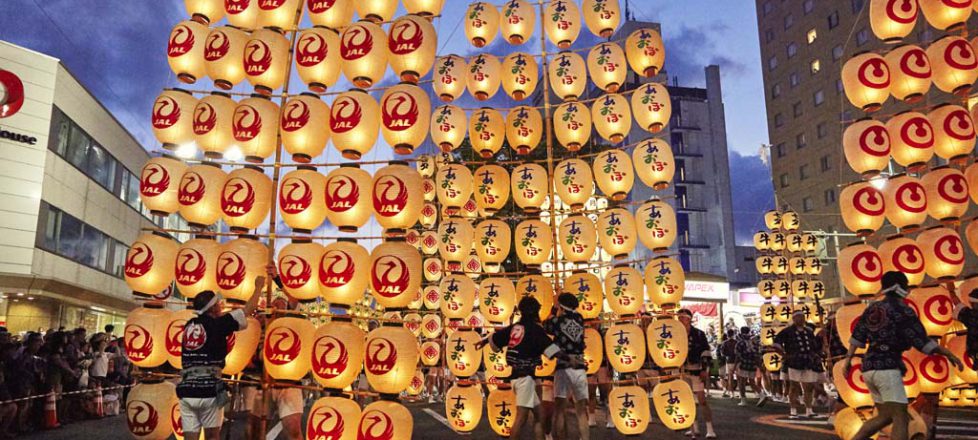
Surrounding Area of Tokyo (Kanto)
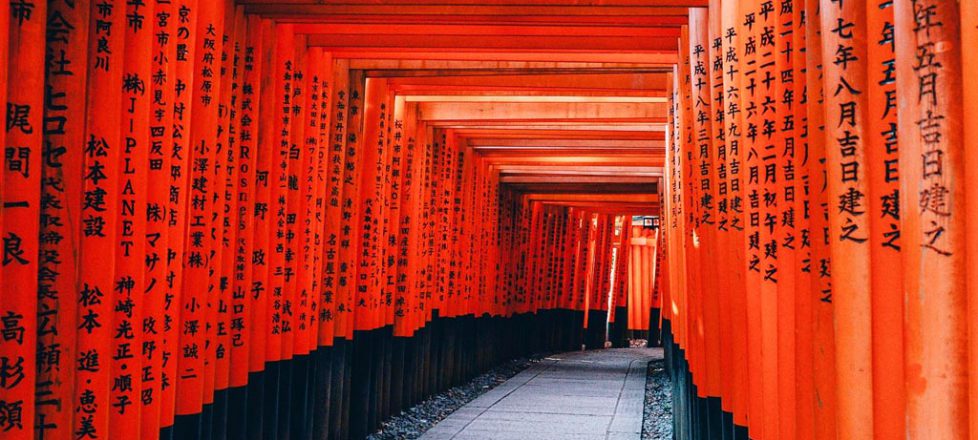
Custom Tour
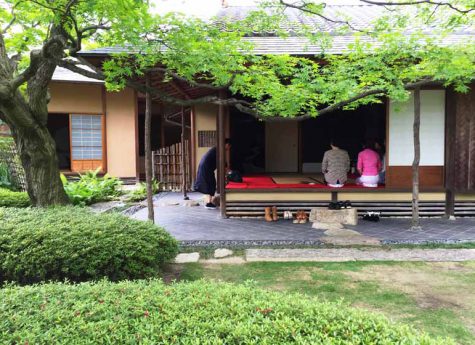
Japan Study Tour
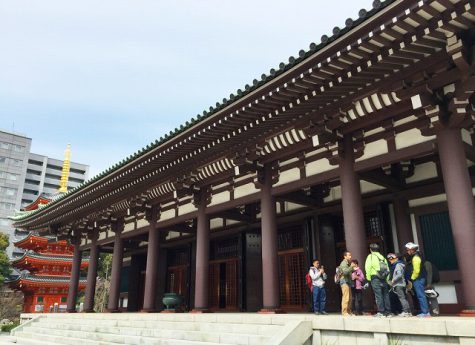
One Day Tour

Japan Travel Guide
Japan is an island nation, and Japanese archipelago stretches long from north to south, it has a variety of climatic zones, from subarctic in the north to subtropical in the…

Our Efforts to Achieve the SDGs
Efforts to Achieve the SDGs Based on our mission, we at Trip Insight Corp. will actively work to solve social issues through our travel business. Our objective is to achieve…

Company Profile Company Name Trip Insight Corp. Established 1 July 2008 Licensed Travel Agency / Fukuoka Gov. No.3-775 Operations -Tour planningTrip Insight (Custom Tour and Study Tour in Japan)Fukuoka WalksFukuoka…
Customer Testimonies
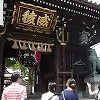
My guide was an excellent tour guide and was very informative – I learnt a lot, she is also a lovely person and it was fun chatting to her. I really enjoyed the attractions I saw as I don’t think I would have visited them otherwise and they gave me a great insight into Japanese traditions and history.

It was an extremely enjoyable way to see the city. I saw many things I might not have seen otherwise. The guide was very knowledgeable and clearly cares a lot about and is proud of Fukuoka.
Privacy Overview
Study Tour to Japan
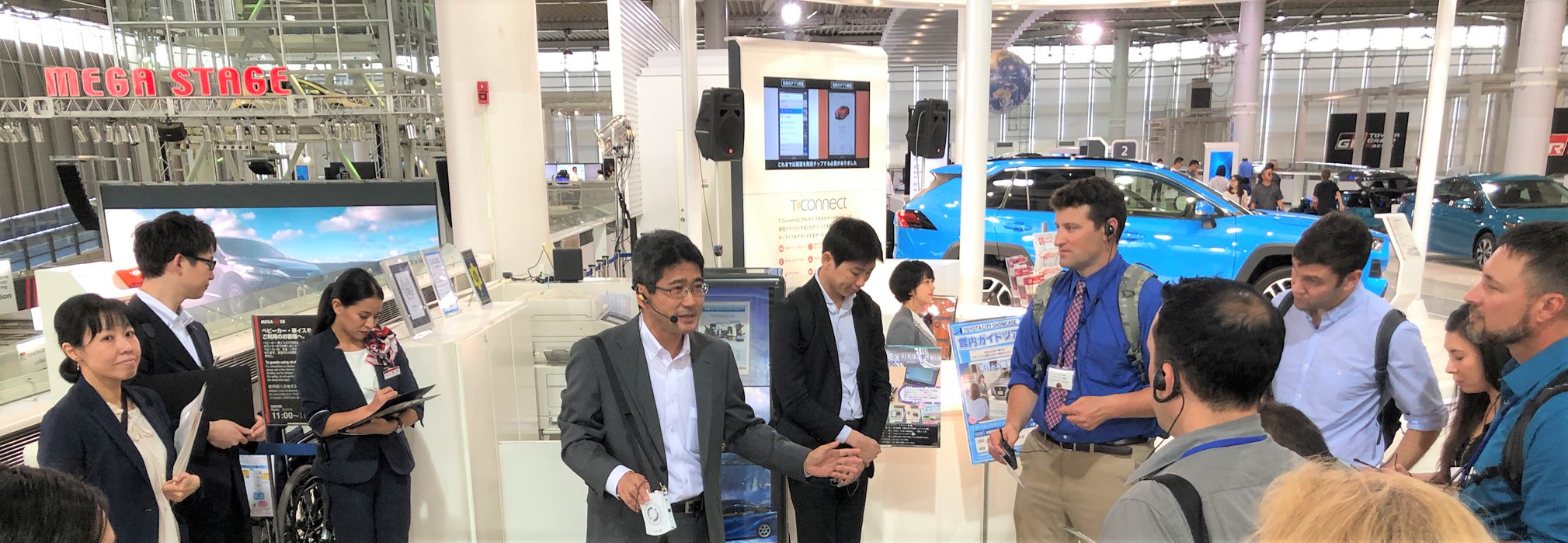
KKC Fellowship Program for North American Social Studies Teachers

The KKC Study Tour to Japan is full of opportunities to:
-Interact with Japanese students, -Exchange views with Japanese school teachers, -Discuss with scholars and experts on Japanese society, -Meet business leaders, and -Enjoy traditional and contemporary Japanese culture.
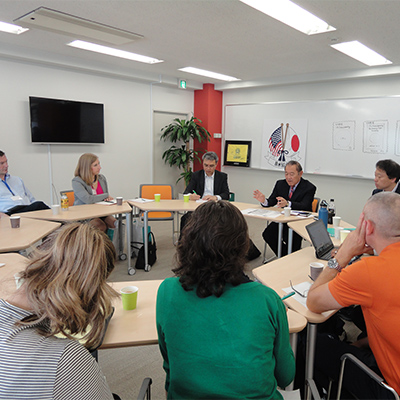
Keizai Koho Center offers the KKC Study Tour to Japan for North American Middle and High School Teachers in cooperation with the National Association of Japan-America Societies (NAJAS). The 2019 KKC fellows visited Japan from 24th June to 2nd July.
Voices of Past Participants

Japan: A Place of Mindfulness
Leah Bouas, 2019 KKC Fellow
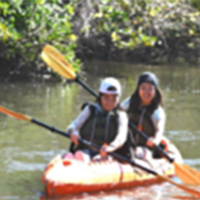
Development of a Sister-School Relationship with Japan
Patrick Whelan, 2012 KKC Fellow

The Power of KKC Fellowship Study Tours
Mike Raymer, 2009 KKC Fellow Executive Director, Georgia Council on Economic Education

Author of Every Student’s Dream: The International School for the Arts
William Smyth, 1993 KKC Fellow
Program Reports
- KKC Study Tour to Japan 2023
- KKC Study Tour to Japan 2022
- KKC Online Study Tour to Japan 2021
- KKC Fellowship Program Online Meeting 2020
- KKC Study Tour to Japan 2019
- KKC Study Tour to Japan 2018
- KKC Study Tour to Japan 2017
- KKC Study Tour to Japan 2016
Lesson Plans
- 2023 Lesson Plans
- 2021 Lesson Plans
- 2019 Lesson Plans
- Best Lesson Plan of 2019
- 2018 Lesson Plans
- Best Lesson Plan of 2018
- 2017 Lesson Plans
- Best Lesson Plan of 2017
- 2016 Lesson Plans
- Best Lesson Plan of 2016
- How to Apply
- KKC Study Tour to Japan 2024
- 2024 Brochure
KKC Fellowship Program Newsletter
- Newsletter (August, 2023)
- Newsletter (February, 2023)
- Newsletter (November, 2022)
- Newsletter (December, 2021)
- Newsletter (December, 2020)
- Newsletter (June, 2020)
- Newsletter (November, 2019)
- Newsletter (January, 2019)
- Newsletter (August, 2018)
- Newsletter (November, 2017)
- Newsletter (July, 2017)
- Newsletter (November, 2016)
+81-3-5990-5540
- Japanese Language Schools
- Universities
- High Schools
- Online Language Programs
- Special Programs
- Become a PRO Mangaka in Japan with the Global Tokiwaso Project!
- Private Intensive Manga Program
- 2-Week Intensive Manga Program
Prep for Japan
May 24, 2024
Application Process
Do you want to study in Japan but don´t know where to start from? Let´s do it together!
Step 1: Choose Your Program and School
First things first, you need to decide what and where you want to study. Japan offers a variety of programs, from language schools to universities with specialized courses.
- Identify Your Goals: Are you looking to improve your Japanese language skills, or are you aiming for a degree in a specific field? Knowing your goals will help narrow down your choices.
- Research Schools: Once you have a clear goal, research schools that offer programs aligned with your interests. Consider factors like location, reputation, and available courses.
Pro Tip: Check out university rankings and read student reviews to get a better sense of each institution.
Step 2: Understand the Application Process
Each school has its own application process, so make sure you understand what’s required for your chosen program.
Gather Necessary Documents: Typical documents include academic transcripts, recommendation letters, a personal statement, and proof of Japanese or English proficiency (depending on the language of instruction).
Application Deadlines: Mark the application deadlines on your calendar. Japanese schools often have different timelines compared to those in your home country.
Pro Tip: Start gathering your documents early to avoid last-minute stress.
Step 3: Budgeting and Financing
Studying abroad can be expensive, so it’s crucial to plan your finances.
Estimate Costs: Consider tuition fees, accommodation, food, transportation, and other living expenses. Don’t forget to factor in health insurance and study materials.
Look for Scholarships: There are numerous scholarships available for international students. Research options like the MEXT Scholarship, JASSO scholarships, and private foundation grants.
Pro Tip: Apply for scholarships early and apply for multiple ones to increase your chances of securing funding.
Step 4: Obtain Your Student Visa
Once you’ve been accepted into a program, the next step is obtaining your student visa.
Certificate of Eligibility (COE): Your school will apply for a Certificate of Eligibility on your behalf, which you’ll need to obtain your visa.
Visa Application: Once you have your COE, apply for a student visa at your nearest Japanese embassy or consulate. You’ll need to submit your passport, visa application form, COE, and a passport-sized photo.
Pro Tip: Start the visa process as soon as you receive your COE to avoid delays.
Step 5: Prepare for Departure
With your visa in hand, it’s time to prepare for your journey to Japan.
Book Your Flight : Look for flights well in advance to get the best deals. Aim to arrive a few days before your program starts to settle in.
Accommodation : I f you haven’t arranged accommodation through your school, look for options like student dormitories, shared apartments, or homestays.
Packing: Pack smart—bring essentials, but don’t overpack. Remember, you can buy most things in Japan. Important items include clothing for different seasons, any necessary medication, and personal electronics.
Pro Tip: Learn some basic Japanese phrases to help you navigate your first few days.
Step 6: Arrival and Orientation
Congratulations, you’ve made it to Japan! Now it’s time to get settled and start your adventure.
Attend Orientation : Most schools offer orientation sessions for new students. These sessions are crucial for understanding your new environment and meeting fellow students.
Register at City Hall : Within 14 days of your arrival, you’ll need to register your residence at the local city hall and enroll in the National Health Insurance.
- Explore Your Surroundings: Take some time to explore your new city, familiarize yourself with the public transportation system, and find local shops and restaurants.
Pro Tip: Join clubs or groups at your school to make friends and immerse yourself in the culture.
Wrapping It Up
Planning your study abroad adventure in Japan might seem overwhelming, but by breaking it down into these six steps, you can make the process manageable and even enjoyable. From choosing the right program to settling into your new home, every step brings you closer to an unforgettable experience in Japan. So, start planning, and get ready for the adventure of a lifetime!
Related Blogs

Documents you need to apply for a Student Visa in Japan

What are the Japanese Language Tests? JLPT, EJU & more
Prep for Japan Student Life

Financial Planning: The Guide

Scholarships for Studying in Japan
- Back to blog list

Study in Japan and experience the culture!
Study Abroad Agency in Japan
World Horizon

JAPAN - Where tradition meets the future | JNTO
![study tour in japanese [ver.2] JAPAN - Where tradition meets the future | JNTO](https://i.ytimg.com/vi/gqYzEv_AqYM/mqdefault.jpg 1x, https://i.ytimg.com/vi/gqYzEv_AqYM/maxresdefault.jpg 2x)
[ver.2] JAPAN - Where tradition meets the future | JNTO
![study tour in japanese [Tokyo Tokyo Concept Video] Old meets New - Full version](https://i.ytimg.com/vi/9FARBtN7Hiw/mqdefault.jpg 1x, https://i.ytimg.com/vi/9FARBtN7Hiw/maxresdefault.jpg 2x)
[Tokyo Tokyo Concept Video] Old meets New - Full version
Click here to see the official Japan National Tourism Organization website:
Click here to see the official Tokyo Metropolitan Government website:

Let’s start your journey in Japan!
Hello! We are World Horizon, a study abroad agency in Japan.
We fully support people who want to study abroad in Japan.
Interested?But facing these obstacles? - Which resources should I use to look for a good school? - How should I decide which school suits me the best?
You might need more information about… - Beneficial language schools and recommendations concerning the opportunity for further education or searching for a job in Japan. - Applying for a VISA - Homestay experience - Practical experience while learning Japanese, for example in the nursing field
We understand that it is difficult to find the right school by just searching on the internet by yourself. Do not worry! We can make it easier for you! We provide precise and local information as our agency is located in Japan.

Consultation to study abroad
Prior information, support for entrance exam, other support for traveling to japan, other support during your stay in japan , support for choosing a local school, cooperation with local japanese schools, procedural support, termination support, consultation for your career and future courses after graduation.

Service Details
Japan currently has more than 700 language schools. We choose the best school for you based on teacher quality, feedback from students, course variety, tuition and so on. Also, a strong relationship with each language school makes it possible for us to introduce you to the school that best matches your inquiry.
If you decide to join us, we will be able to provide helpful information as outlined below.
Japanese school
・Details of the recommended school and the reason
・Positives and Negatives
・Teachers and Staff
・Courses, Class atmosphere, School events
・Feedback from students
・Career achievement
・Nationality percentage, An enrollment number
・Terms, Application deadline
・Preparation for application format
・Criteria for selection, Selection process
・Tuition/Other expenses/Payment method
・Scholarships
・General living conditions support
(Dorm・Private residence・Part-time job・Transportation from airport)
・Useful local information, for example Security, Sightseeing and so on
・Economic and other latest news
・Japanese manners, Food, Other necessary Information
・Overseas Insurance
・Success / failure stories
・Tips to reduce total cost of the study abroad (Terms, location...etc)

We are a Japanese study-abroad agency. You can have confidence in our large body of information and the quality of our services.
◆ Large amount of information about Japan and Japanese schools
− We have a lot of information about Japanese schools that allows us to recommend the best school for you that matches your preferences. Also we have the most recent information about security, nearby hospitals and other services around the school or where you will be living.
◆ Strong relationship with Japanese schools
− We have already visited and had discussions with principals in the all schools, so we can share the detailed information of each school that is not available on the website of each school.
◆ Quick response and High quality
− We have a relationship with several legal specialists in Japan as well, so we can smoothly support any issues related to immigration.
◆ Our role to provide assistance with non-school related issues
− Because we are based in Japan, we can support you not only before your arrival but also during your stay here. You are able to contact us at any time and get an immediate response from us! Such as if you have a sudden illness, concern about your living situation, your career, your part-time job and so on.

to enter school

1. Apply for free counseling by filling in a form
2. with your counselor, decide on a school, the terms and time period, 3. submission of school application form, payment for entrance exam, 4. entrance exam, 5. permission from immigration bureau and apply for a certificate of eligibility, 6. complete admission process and payment of tuition, 7. receiving admission permit and certificate of eligibility, 8. apply for a passport and visa, 9. other travel procedures, 10. visiting japan - your life in japan finally begins, note: these steps may change depending on the situation..

Q. What are the requirements to study in Japan?
To study in Japan, you must get a long-term visa after you obtain the Certificate of Eligibility as a student from the Immigration Bureau of Japan. To obtain the Certificate of Eligibility, you will be asked for the following information: - Do you really have intent to study in Japan - Do you have necessary and sufficient Japanese language ability - Do you have enough money to support yourself during your study abroad in Japan
Q. What is the “necessary and sufficient Japanese language ability”?
To enroll in Japanese language schools, you are required to have Japanese language ability equivalent to N5 in JLPT (Japanese Language Proficiency Test). It means you can read and understand typical expressions and sentences written in hiragana, katakana, and basic kanji, and also you can listen and comprehend conversations about topics regularly encountered in daily life and classroom situations, and you are able to pick up necessary information from short conversations spoken slowly. It will be an indication of N5 that you have studied Japanese for a total of about 150 hours. To enroll in collage/university, you must have N2 in JLPT.
Please check the website below for the information of JLPT: https://www.jlpt.jp/e/index.html
Q. To enroll in a Japanese school, what fees should I expect?
First, you need to make payment for the screening fee and the retainer including paperwork and translation fee for immigration. After your Certificate of Eligibility is approved, you have to pay the admission fee, tuition and other expenses to the school. You may have to make payment for your first 3 months rent at this time as well. Also you need funds for applying for a visa in your country and you must purchase airline tickets. You will have living expenses after you come to Japan.
Q. What is the amount of “enough money to support myself during my study abroad in Japan”?
The Immigration Bureau doesn’t officially release the amount of money, but many Japanese schools give applicants a rough indication; 2,000,000 - 3,000,000JPY(18,100 - 27,200USD at the rate of 110JPY to a dollar) in your/your sponsor’s bank account is necessary. If you don’t have it, you can have your family or other relatives as your financial sponsor(s). Unfortunately we cannot either sponsor you or find a sponsor for you.
Q. Are there any possible scholarships I can apply for?
Generally speaking, there are very few scholarships which fully cover the whole cost of studying in Japan. If there are any, they are for top performers and highly competitive. Also, most of the scholarships will cover a part of the tuitions or some living expense only. Therefore, it is very difficult to make a plan to study in Japan relying only on wining scholarships.
Q. Can I have a part-time job during my study abroad in Japan?
If you are approved by the Immigration Bureau, you can work up to 28 hours per week with a student visa.
Q. Is there an age limit to obtain a student visa?
There is no age limitation to obtain a student visa. However, there are some conditions and one of them is: you must apply within 5 years from the graduation of your final education. If you graduated from school more than 5 years earlier, you have to submit an essay to explain why you want to apply for school in Japan.

■ Company Name:
Moon Communications Enterprises G.K.
■ CEO:
Yusuke Yoshizawa
■ Services:
・Consultation for study abroad
・General support service while staying in Japan
・Recruiting services ・Investment in new business with innovation
■ Address:
Level 32, Shinjuku Nomura Building, 1-26-2 Nishi Shinjuku, Shinjuku-ku, Tokyo 163-0532, Japan
Company Info

Let's make your dream happen!
We do not want you to waste your time during your stay in Japan. We will do our best to support you while you are in our country.
If ever you think about traveling here to learn more about Japanese culture, please contact us and tell us what is on your mind!
Counseling Form

Back to Top
Common Searches
- Japan Study Tour
- Language and Cultural Studies
- Student Opportunities
The Japan Study Tour is offered in even-numbered years and, while the itinerary varies from trip to trip, participants can look forward to an astonishing array of authentic experiences in Tokyo, Nikko, and Nagano.
Highlights:
Highlights of past tours include:
- visits to major companies such as Canon and Mitsubishi Fuso ;
- an afternoon of sumo at the Kokugikan and an evening baseball game at the Meiji Jingu Stadium ;
- participation in a tea ceremony at the Oka Tei Japanese-style house;
- a day at the historic Sanja Matsuri festival in Asakusa;
- exchange events with students at Waseda University and Kyoto Sangyo University ;
- hiking to see snow monkeys and soba noodle making with students from Nagano Prefectural College ;
- exploration of the shrines and temples of Nikko , Kyoto , and Nara ;
- and so much more!
- Undergraduate students can earn three credits in INTL BUS 3283 (Japanese Business & Society), JAPAN 3210 (Japanese Culture & Society), or HONORS 4900 (Independent Study in Honors; Honors College permission required)
- Graduate students can earn three credits in INTL BUS 5289 (International Business Strategies).
- A non-credit option is available for community members who wish to take part in the tour without receiving academic credit.
Student Experiences:
Shawn: "This whole experience has been unforgettable, impactful, just magical..."
Brittany: "After being in Japan a little more than two weeks, I've grown to love this country more than I thought possible."
Emily: "Something I learned is that I should not be afraid to try to use the Japanese that I know. It stuns the person you are talking to and also shows them that you are actually trying to learn their language and they really appreciate that!"
Molly: "The trip was incredibly important to me educationally, regarding my major and life goals, but also for me personally."
Amy: "All of the company visits have been helpful for me as I get to closer to graduation and start job hunting to see the different options."
Harper: "It was seriously one of the best experiences I have ever had. It was like standing in their shoes and their culture and just absorbing everything. This trip was spectacular and I would do it again in a heartbeat because the professors were magnificent, the students were willing to put themselves out there, and Japan was just beyond expectation. I expected Tokyo to be New York City, but it was most definitely not. It was utopia."
How to Apply:
For more information or to apply, please visit UMSL Study Abroad or contact Professor Amy Michael at [email protected] .
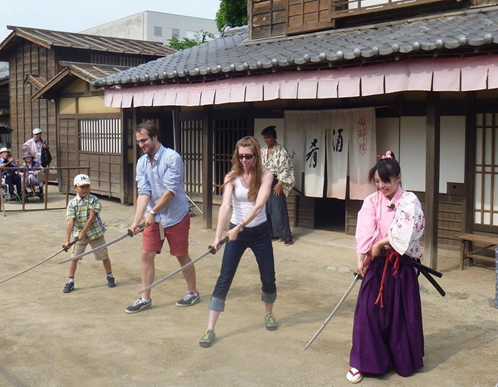
Schools We Work With
- Study Tours to Australia
- Community Involvement
- Homestay Placement
- School Tours to Japan
- Individual School Experience to Japan
- Travel Preparations
- Travel Arrangements
- Homestay Questionnaire
- Homestay Requirements
- Homestay FAQs
- Host Families in Japan
- Kawasaki High School
- Kogyokusha High School
- Kugenuma High School
- Sumida High School
- Swire Cold Storage Technical Tour
- Tomigaoka High School
- Testimonials

- Home Return Home
VS Oceania offers quality, education-centric exchange programs, specialising in student exchange and study tour programs

Staying with a host family provides Japanese students a rare opportunity to experience the Australian way of life

Value Learning
Each visiting student benefits from being exposed to a different culture, new opportunities and new learning experiences.

Welcome to VS Oceania
Vs oceania offers quality, education-centric exchange programs. we specialise in facilitating student exchange and study tour programs for japanese students, and coordinating homestay families ..
Each visiting student benefits from being exposed to a different culture, where they are presented with new opportunities to appreciate new learning experiences as a student in an Australian school. In addition they will have many opportunities to form new friendships that could last a lifetime.
VS Oceania have trained support staff that cater for the students' needs at any time during their stay in Australia. We make all necessary arrangements for each student in a visiting group to be allocated to a host Australian family prior to their arrival.
We also organise tours to Japan for Australian students. We are an accredited travel agency and can arrange ALL your domestic and international travel - CLICK HERE to make a travel booking enquiry .
We look forward to assisting you with your education experience click here to contact us ..
VS Oceania is an educational services provider that offers quality, education-centric exchange programs. We specialise in facilitating student exchange and study tour programs for Japanese students, where our responsibilities include liaising and coordinating with the host schools and homestay families prior to the student's arrival.
Our team comprises of people that genuinely care about the students that come to visit Australia, and our primary goal is to help ensure that their study tour experience is a pleasant and memorable one.
Staying with a host family provides the students a rare opportunity to experience the Australian way of life from a different cultural perspective. Feedback from participating Australian families shows that they find hosting a study tour student is a mutually beneficial experience.
We also organise tours to Japan for Australian students. We are an accredited travel agency and can arrange ALL your domestic and international travel - CLICK HERE to make a travel booking enquiry .
Please browse our Gallery and watch video Testimonials from Australian schools. For more information, click through to About Us , Study Tours , Host Families , or CLICK HERE to contact us .
We look forward to assisting you with your education or travel experience!
What Our Clients Say
The value to the japanese students and our students is amazing, and for the families who host the japanese students, the experience is equally valuable. we see a marked changed in students when they have participated in the exchange program. it's an incredibly wonderful exercise., penrith anglican college, office info.
Suite 23/33 Waterloo Road, North Ryde NSW 2113
Phone: +(612) 9889 4366
Fax: +(612) 9887 3254, email: this email address is being protected from spambots. you need javascript enabled to view it. document.getelementbyid('cloak0dea31f657682061e74bfdd9fe9b2f8c').innerhtml = ''; var prefix = 'ma' + 'il' + 'to'; var path = 'hr' + 'ef' + '='; var addy0dea31f657682061e74bfdd9fe9b2f8c = 'admin' + '@'; addy0dea31f657682061e74bfdd9fe9b2f8c = addy0dea31f657682061e74bfdd9fe9b2f8c + 'vsoceania' + '.' + 'com'; var addy_text0dea31f657682061e74bfdd9fe9b2f8c = 'admin' + '@' + 'vsoceania' + '.' + 'com';document.getelementbyid('cloak0dea31f657682061e74bfdd9fe9b2f8c').innerhtml += ' '+addy_text0dea31f657682061e74bfdd9fe9b2f8c+' ';.
Phone: +(612) 9889 4366 Fax: +(612) 9887 3254
Need a travel booking?
We can book all your flights, hotels, cruises, car hire and insurance!
CLICK HERE TO ENQUIRE

Penrith Anglican College Barry Roots (Headmaster)
Get to know our english teachers and tour liaison staff.

- Our Services
- Host Families
CLICK HERE for a full list of the school we work with

The Ministry of Foreign Affairs website uses JavaScript. Please turn on "JavaScript" and use it.

Press Releases
Study tour to yame city, fukuoka prefecture for diplomatic corps in japan.
The Ministry of Foreign Affairs of Japan, in collaboration with Yame City, Fukuoka Prefecture will conduct a study tour to Yame City for diplomatic corps in Japan on June 6 and 7, 2024.
- The study tour has been conducted annually since 2010 by the Ministry of Foreign Affairs with local governments or bodies in order to introduce diverse attractions such as history, culture, tourism, local products, and industries of Japan’s regional areas to diplomatic corps in Japan.
- In this tour, under the theme of “Tour Exploring the Tradition of Yame, Land of Tea”, diverse charms will be introduced to participants including history, culture, food, industries, tourism and local products of Yame City.
- It is expected that this study tour will provide an opportunity for diplomatic corps to deepen their understanding of various attractiveness of Yame City, and promote exchanges between Yame City, and the participating countries.
Related Links
- Diplomats’ Study Tours
Japan Local Government Centre (JLGC) : London
Japan local government centre is the london office of the council of local authorities for international relations (clair), which was established in 1988, japan study tour, projects and activities.
FUKUSHIMA PREFECTURE & TOKYO 14-20 January 2024
( applications now closed )
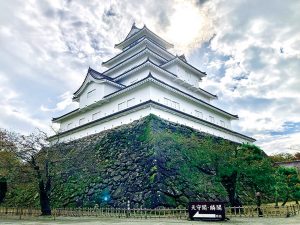
Tsurugajo Castle
Outline of the Japan Study Tour 2024
This year’s tour is hosted by Fukushima Prefecture, on the theme of “ Reconstruction and Recovery”
Full Theme Title: Reconstruction and Recovery from the 2011 Great East Japan Earthquake and Nuclear Disaster – Industry, Produce and Cooperation.
Theme Description:
The Great East Japan Earthquake of September 2011 and the incident at TEPCO’s Fukushima No.1 nuclear power plant caused great damage in Fukushima Prefecture and the process of recovery continues. More than 12 years have passed since the earthquake, and a variety of reconstruction projects are proceeding in different parts of the prefecture.
Industry – In the coastal areas of Fukushima Prefecture, forced to evacuate due to the damage caused by the tsunami and the nuclear power plant accident, researchers and businesses from home and abroad have now gathered at a base established to create new industries. The following is an introduction to the new attractions of Fukushima Prefecture, where much future development is expected.
Candidate sites: Fukushima Robot Test Field, Fukushima Hydrogen Energy Research Field, others TBC.*
Produce: In June 2022, import restrictions on Japanese food products were abolished in the UK. Promoting the quality of local produce is an important measure for the prefecture, such as publicising food safety and security domestically and internationally, and the prefecture has actively promoted the attractiveness of food at every opportunity. The participants will be introduced to these efforts and will be able to fully enjoy the culinary attractions that can only be experienced in the local area.
Candidate sites: local sake breweries, strawberry farms, agricultural centres, and others TBC.*
Cooperation: The Great East Japan Earthquake and the nuclear power plant accident caused a sudden drop in tourism and private-sector exchanges, but various initiatives have led to a recovery through international cooperation projects, including inbound tourism. In particular, the city of Motomiya in the prefecture has been active in youth exchange with the UK since the earthquake. The British Garden was established in the Motomiya when Prince William visited Japan, while a Fukushima Garden was built in The Royal Borough of Chelsea and Kensington. The city was also host for sporting events as part of the Tokyo Olympics in 2021. School exchanges are continuing, with junior high school students coming and going between Japan and the UK. The participants will be able to visit the British Garden with the opportunity to discuss experiences of living in the prefecture with the students who have visited the UK.
Candidate sites: Motomiya City (British Garden), exchange with students, others TBC.*
JLGC London each year invites senior executives in local government and staff working in the public sector within the jurisdiction of the countries covered by our office (the UK, Republic of Ireland and other countries within Northern Europe) to Japan for a week-long tour and series of seminars and workshops: to exchange best practice, opinions and information on the current state and issues of local autonomy, and to deepen understanding of each other’s local autonomy systems.
JLGC ’ s annual Japan Study Tour will next be hosted by Fukushima Prefecture , in 202 4 after an orientation into local government at our head office CLAIR Tokyo in the capital and site visits to various facilities run by the Tokyo Metropolitan Government (details TBC ), the city government for one of the world ’ s largest metropolises.
The Fukushima Prefecture segment of the tour will help participants learn how Japanese cities of varying scale improve local services through a devolved local government system. Participants will see a broad spectrum of best practice and local government strategies including urban renewal, environmental protection and supporting local businesses and communities .
JLGC invites applicants from senior-level staff of UK and Northern European local government and public sector organisations to join this seven-day tour to see how Japan tackles challenges for the future.
Successful applicants will be asked to attend an orientation meeting at JLGC London offices (also potentially online) in December (TBC).
The Tour schedule details are tentative and will be updated on this page – Follow @jlgclondon on Twitter for updates on these details.
*Full site visit details and the confirmed schedule are expected at the end of August
For more information, for any questions about eligibility or to request the application form and outline document to be sent as an attachment, please email “ JST 202 4 Fu kushima ” in the subject bar to [email protected] .
JST 2024 Participant Application Form (PDF)
JST 2024 Participant Application Form (Word)
CLAIR – Fair Processing Notice

75+ Japan Travel Tips for 1st Time Visitors from the USA (2024)
After returning from two weeks in Japan , I was bombarded with questions from readers, friends, and family who were curious about our trip or considering planning their own Japan trip. I get it, planning a trip to Japan can be intimidating with concerns about culture shock or language barriers. To help those planning their first trip to Japan, I put together these Japan travel tips for first time visitors to bring together everything we learned and things we really wished we knew before we went.
To make it easier to digest, I’ve broken these travel tips for Japan into categories including before you go, things to know on arrival, money matters, getting around, eating in Japan, what to wear in Japan, and general information about the Japanese culture.
Before we jump in, let me assure you that Japan is a fabulous country to visit, even for those from the USA or another Western country. The Japanese people are extremely polite, the cities are the cleanest you have ever seen, and the language barrier is really minimal. For these reasons and more, Japan makes an excellent first country to visit in Asia.
If you are planning a trip, be sure to also check out my very detailed itineraries for Tokyo , Kyoto , and Osaka , or my article about how much a trip to Japan costs .
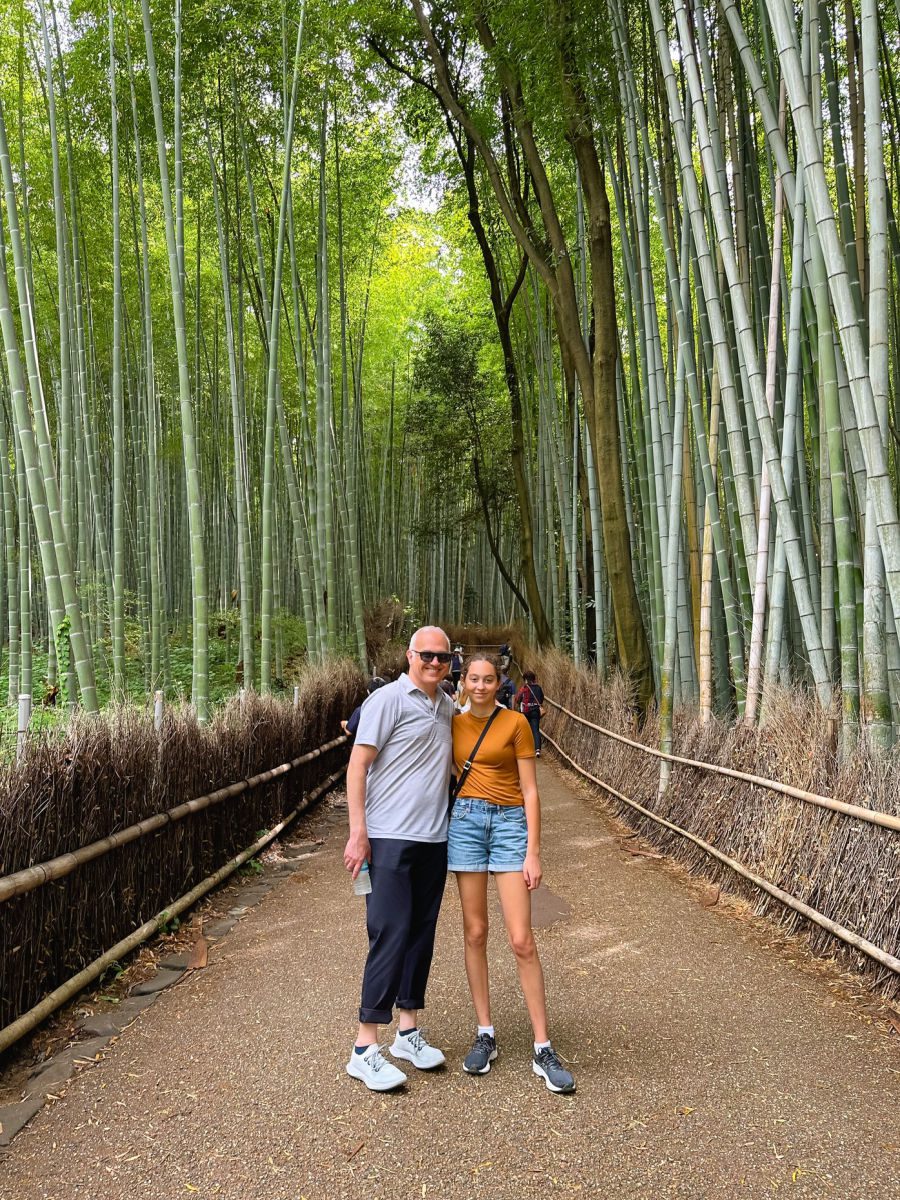
Japan Travel Tips: Before You Leave
Note: This post may contain affiliate links. If you click a link and make a purchase, I may receive a small commission. All opinions are my own.
Luckily, visiting Japan is quite easy. However, there are still a few things to do before you leave:
- Decide if you want to purchase a Japan Rail Pass for use in Japan. This pass is only available to overseas tourists and must be purchased before you arrive. Keep in mind that the JR Pass is ONLY valid on JR Trains (not Metro systems or private train lines) and there are different passes offered, depending on if you are traveling just within one region or throughout multiple regions (when you need a National Pass.) Prices have gone up recently so you really want to calculate how much you will use the Pass versus the cost of buying individual train tickets to see if it is worth the trouble.
- Prefill all required immigration and customs information on the Visit Japan Web site before you leave so that all you need to do upon arrival is show your QR codes for each person in your party.
- If you have prescription medications, be sure to research what medications are prohibited in Japan, as many common over-the-counter medications and prescriptions are illegal in Japan.
- Book all of your accommodations well in advance, especially if you are visiting during the busy springtime Cherry Blossom Season or Golden Week in early May. Keep in mind that Japanese hotel rooms are pretty small so if you want more space you may want to spend a bit more on an American brand. You can also consider staying one to two nights in a ryokan, a traditional Japanese inn that typically features tatami-matted rooms and communal baths known as onsens. To save money, you may want to consider an Airbnb or capsule hotel.
- Book as many restaurant reservations as possible a few weeks in advance, especially if you are looking to experience some of Japan’s many renowned Michelin Star or fine dining options. Not all restaurants offer online booking but this is where a hotel concierge can help, or there are paid restaurant booking services (that I’ll discuss more below.)
- Buy timed-entry tickets to popular attractions that sell out, especially TeamLab Planets Tokyo or Sumo practice .
- Reserve a mobile WiFi hot spot that you will pick up at the airport, or look into an international eSIM provider , as this will typically be cheaper than an international data plan on most cellular carriers.
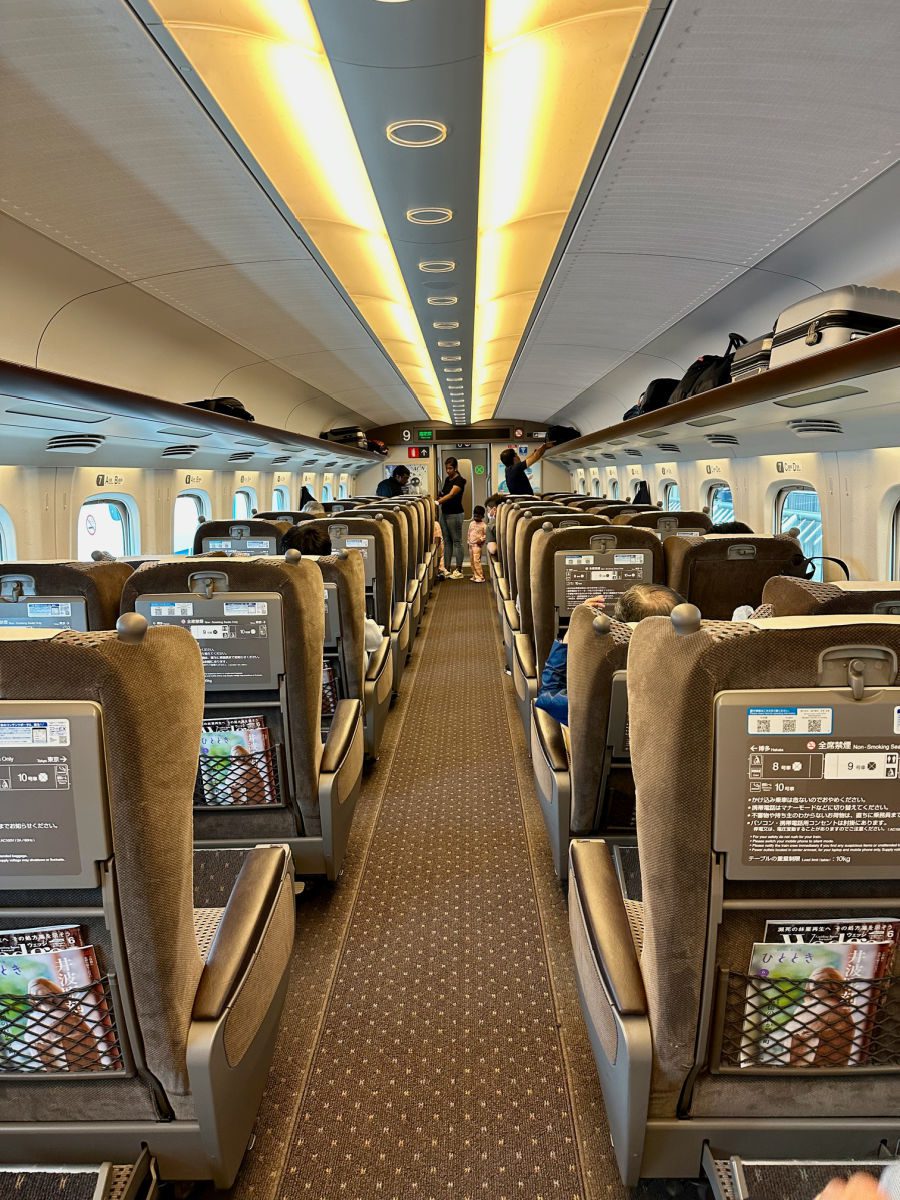
What to do when you arrive in Japan
If you fly into Tokyo, you will arrive at either at Narita Airport (NRT) or Haneda Airport (HND) in Tokyo. Narita is over one hour from the city center, while Haneda is a lot closer. In either instance, taxis from the airport will be quite expensive and it pays to look into alternative transportation options.
Since we flew on Delta, we arrived at Haneda Airport, which is connected to Tokyo via a monorail or train options. We didn’t want to deal with transferring trains and metros with our large luggage after a full day of travel, so I booked the Airport Limousine Bus , which provided door-to-door transfers from Haneda airport to our hotel (the Hilton Tokyo) at a very affordable rate.
Before you leave the airport, there are a few important things you need to do first!
- Go to an ATM and withdraw about 50,000 Yen to start. Remember you want to withdraw as much as you think you might need in one chunk versus multiple smaller withdrawals to avoid extra fees. While Japan has moved to be more contactless post-Covid, there are still many smaller restaurants, shops, and food stalls that only take cash. And even the high-tech machines you use to get your IC Cards only take cash (bizarre, I know!)
- Purchase an IC Card. An IC Card is a rechargeable, prepaid travel card that is used to access public transportation including metros, busses, and some ferries throughout Japan. Many vending machines also accept IC cards as payment and you can also use them to rent lockers in train stations. There are different flavors of IC cards such as the Pasmo or Suica card. Some require a 500 Yen deposit. However, at the airport, you can use a touch-screen machine (with an English option) to purchase a Welcome Suica card, which does not require a deposit. You must pay cash to load money onto your IC card. I’d recommend putting about 3,000-5,000 Yen on each card to start for a 14-day trip. Because of a chip shortage, it is now harder to get a physical IC card, but you should still be able to purchase the Welcome Suica card at the airport or large train stations. You can also try to load a digital IC card if you have an Apple iPhone with either a Mastercard, American Express, or Apple Card connected to your Apple Pay.
- Keep in mind that each person in your party needs their own card . You cannot use the same card to swipe multiple people through a turnstile. When you go to use the card, you tap it on the reader at the turnstile and then tap again to exit the station. On a bus, you typically only tap it to exit. If you are able to load a digital IC card, you can just tap your phone at the readers.
- Pick up a mobile hotspot or international SIM . Unless you are using an eSim , you may want to reserve a mobile hotspot or purchase an international SIM card for your two weeks in Japan. These work out to be cheaper than paying for most international calling plans. For example, Verizon charges me $10/day for data and throttles the speed after a certain threshold is met. But, we rented a mobile hotspot from Ninja WiFi for $98 for unlimited data for 14 days. This allowed all three of our devices to stay connected for much less than we would pay for one phone’s international plan. There are many shops to rent a hotspot or purchase a SIM card at the airport and you just drop it off before your flight home.
- Exchange your JR Pass vouchers . If you plan on using a Japan Rail Pass, you need to purchase it online before you leave home. You will be sent a voucher that you exchange upon arrival in Japan at certain JR ticket offices. The ticket offices in the airports will exchange your voucher for a pass, but you may need to visit a JR ticket office at one of the major train stations to make seat reservations (depending on which level pass you purchase.)
- Also keep in mind that if you are traveling with checked luggage size bags, you will need a luggage reservation on the bullet trains (and these are limited), or you can arrange to ship your luggage ahead.
- Depending on the JR ticket office, they may also make train reservations for you (if you purchased a pass that includes seat reservations such as a Green JR Pass.) If not, you can do this at the ticket offices in the major train stations, such as Tokyo Train Station, Shinjuku Train Station, etc.
- Arrange a transfer to your hotel. Taxis are very expensive in Japan, especially if you are traveling all the way into center Tokyo from Narita airport. It is cheapest to use public transportation. However, another option, depending on where you are staying, is the Airport Limosuine Bus, which connects the airports with central train stations and hotels for door-to-door service. It is nice to not have to navigate the trains on your first day in Japan (when you are still tired and jetlagged.) I booked our bus in advance and gave too much time to get through customs and the other steps at the airport and had to switch to an earlier bus when I got there. You may want to just wait until you clear immigration/customs before you book your bus transfer from the desk at the airport.
- When you get to your hotel, don’t lock your passport away in your hotel safe. It is required that you carry your passport with you when you are out and about in Japan. I’d suggest keeping hard copies in a safe space in your hotel just in case it gets lost (and a picture of it on your phone.)
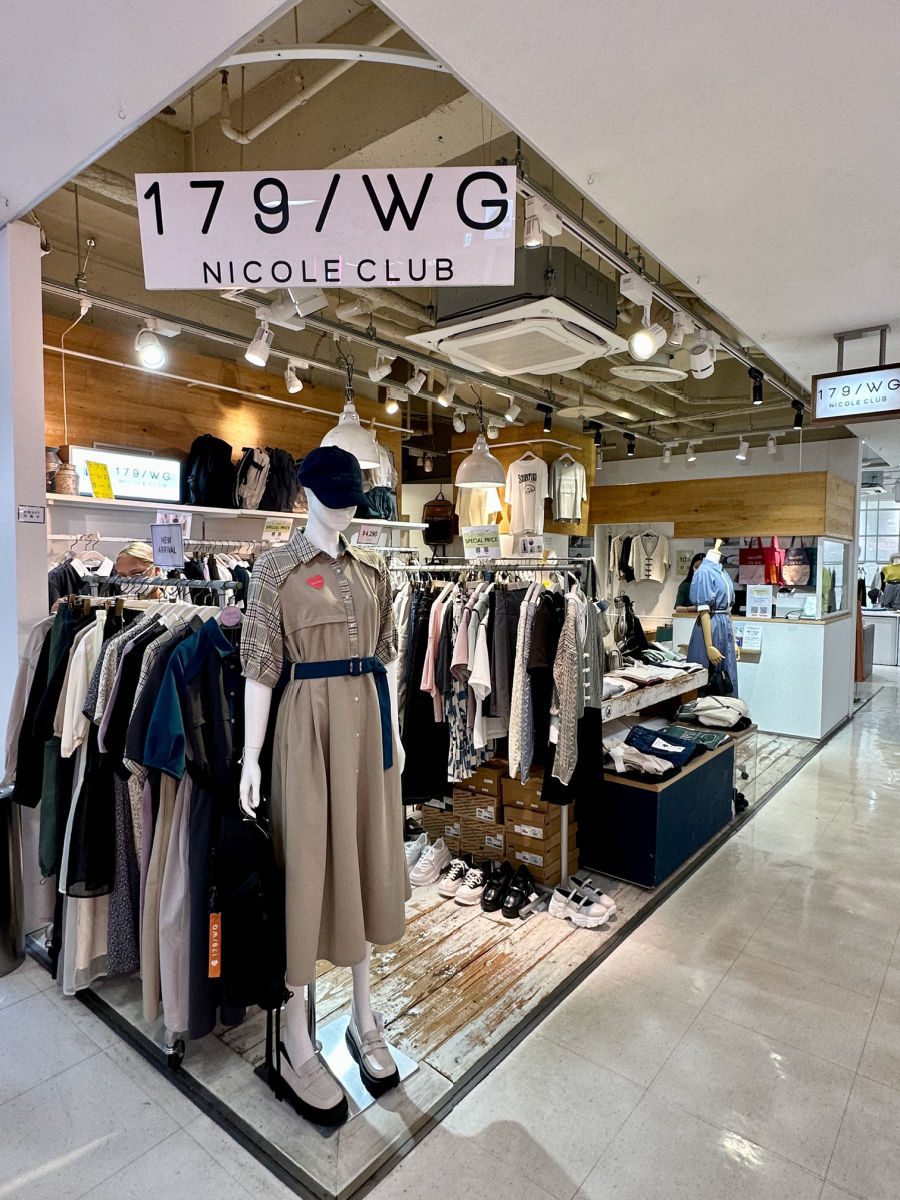
Japan Money & Shopping Tips
- The local currency is the Japanese Yen. The current exchange rate is $1.00 = ~ 156 Japanese Yen. You can check the current exchange rate using XE.com .
- Always keep some cash on you, including some change, as many businesses and attractions still do not accept credit cards. Change is used especially when visiting temples or shrines to make an offering, purchase a charm, or receive a fortune.
- While many establishments now accept credit cards, not many support Apple Pay (they have a local digital contactless payment system). You will generally need to insert your credit card and sign a receipt. Don’t be surprised when the clerk hands you both the original receipt and the credit card receipt for each transaction.
- Not many businesses accept American Express and some also don’t accept MasterCard. To be safe, carry a couple of cards and make at least one of them a Visa.
- To reduce the use of plastic, shops now charge a small amount for a shopping bag (typically about 20 Yen). To avoid this fee or excess packaging, carry a packable reusable shopping bag such as these .
- Some shops advertise Tax-Free Shopping. If you see this sign, give them your passport and they will take the tax off your purchase on-site, without any forms to drop off at the airport. This saves around 10% for purchases over a certain amount. Other shops participate in the Global Blue tax refund, but for those you will need to fill out paperwork and bring it to a Global Blue location at the airport or in the shopping center with the goods you purchased.
- Tipping is NOT customary in Japan. Honestly, after the creep of the tipping culture in the U.S. in the last few years, it is such a pleasure to not tip in Japan and to know it is not expected. Some restaurants may charge a cover charge but that is it.
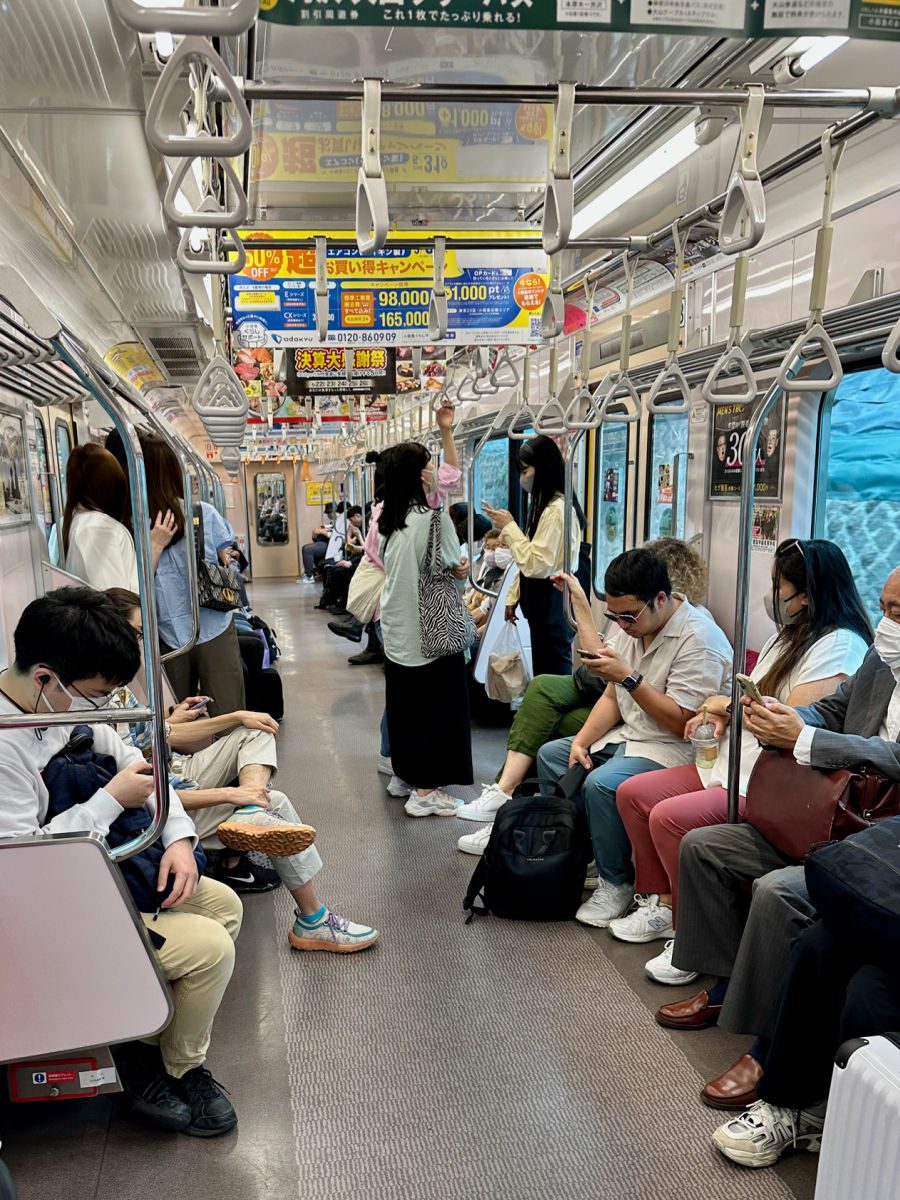
Tips for Getting Around Japan
Getting around Japan is very easy with its efficient and usually prompt train and public transportation system. However, there are a few things that will make getting around the cities a little easier:
- Travel between cities is easiest using the Shinkansen bullet train. Just keep in mind that the fastest bullet trains, the Nozomi and Mizuho Shinkansen trains, are not included in the JR Pass.
- If you take the Shinkansen from Tokyo to Kyoto, try to get a seat on the right hand side of the train and on a clear day, you will get a great view of Mount Fuji.
- Most trains do not require reservations, but purchasing a ticket with a reserved seat or a JR Pass that includes reservations, is much more pleasant as you know you will have a seat, even on busy trains. The platform will indicate which train cars are reserved versus non-reserved.
- You need a luggage reservation when bringing large checked bags onto a Shinkansen train. Keep in mind that there is very limited luggage rack space and otherwise only the seats in the last row also offer a luggage reservation in the space behind the seats. If you plan on bringing your bags on the train, I recommend stopping at the JR ticket office in one of the large train stations and getting help reserving seats and luggage spaces.
- Smaller carry-on size bags can fit on the rack over the seats. Just keep in mind that bringing any bags through the metro at rush hour is near impossible on the busy lines.
- You may want to consider shipping your luggage ahead to your next hotel. Depending on the location and season, this can typically be done in 24 hours, so that you can travel with just a backpack or small bag with your things and reunite with your luggage at your next hotel or the shipping office in the next city. Most of the hotels will arrange for your luggage shipping at the concierge or bell desk. However, if you are staying at an Airbnb, you can look into using a shipper such as Yamato Transport . We did this between Tokyo and Kyoto and Kyoto and Osaka and it made getting around so much easier. It cost less than $20 per bag for our ~50 lb. checked-luggage sized bags.
- In most cities, in addition to Japan Rail (JR) trains, there are also private trains and local metro or subway systems. Google Maps is extremely helpful in determining the best route, but you may want to do a little more research if you are trying to use JR trains. The route search on the official Japan Travel App from the Japan National Tourism Organization or the Japan Travel app from Navitime are helpful if you want to find the best routes for specific types of tourist passes.
- To use your JR Pass, simply insert your JR Pass at the turnstile and take it back after you walk through. You will need to do the same when you exit the station.
- If you are using your IC Card, tap the card at the turnstile when you enter the station and tap again when you exit. Keep an eye on your balance. Most stations have machines where you can easily reload your IC card (with an English menu.)
- If you have any trouble, the staff at the train stations are very helpful in providing directions.
- When it comes to using the trains and subways, Google Maps offers invaluable information regarding which platform the train will be on, when it is leaving (and when the next trains are expected), what car is best to board if you are transferring, the length of the trip and the number of stops, the stop name, the cost with an IC Card, and the best exit to use at the train station (trust me that this is so, so helpful.)
- On trains and subways in major cities, all the train signage both on the platform and in the train cars, is offered in Japanese and English, as are the announcements on the train letting you know the next stop, etc.
- Once you are on the train platform, you will need to line up behind the yellow line at one of the spots indicated by a number that corresponds with the car number. In Japan, it is customary to line up single file.
- When the train arrives, let those exiting to get off the train before boarding.
- Note that on some trains, certain cars indicated with pink on the platform are for women only during certain hours.
- The only time you might see pushing in Japan is people squeezing themselves onto a subway train. Rush hour on certain lines such as the Maranouchi line in the Tokyo Metro that goes through Shinjuku station, which is the busiest station in the world they claim, is an absolute crush and best to avoid, especially with small children.
- Once on the train, follow the local customs and silence your phone and if you talk, do so quietly. The trains and subways in Japan are very quiet and surprisingly clean. People do not talk or eat on the train. Many nap, others read or play games. I saw plenty of people reading manga comics on their phones and even one guy reading sheet music for “Moon River.”
- Note that while walking through busy train stations and on the street, people typically walk on the left. Except in Osaka, where it is customary to walk on the right. Many stations have arrows on the floors.
- On escalators, stand on the left to let those in a rush go by on the right. Except in Osaka, then stand on the right.
- If you are using a maps app for walking directions and you are using a mobile hotspot, we found Apple Maps to offer better turn-by-turn walking directions that were easier to follow. The arrow on Google Maps used to indicate your location would often spin in a confusing way and it wasn’t as clear about when to go up steps, across bridges, etc.
- Most train stations offer lockers if you want to store your belongings and go out and explore. There are small, medium and large lockers and the medium and large will fit a suitcase or multiple smaller bags. The price ranges from 300 to 500 Yen.
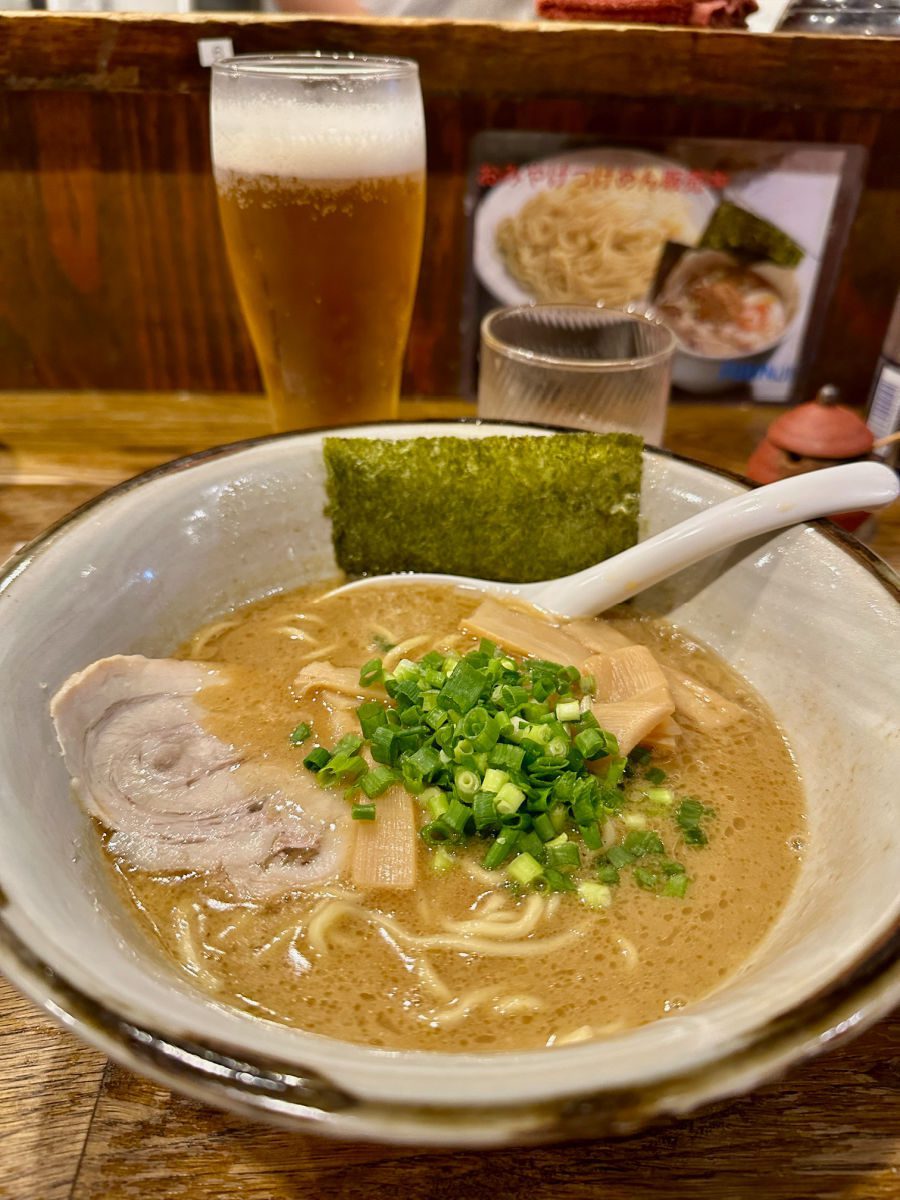
Japanese Food & Restaurant Tips
Japanese cuisine is incredible and no, you don’t have to eat sushi every day. Each shop specializes in a specific dish and does it well. You will eat ramen, soba noodles, tempura, shabu shabu, street food, sushi, and so much more. There are a few things to keep in mind when visiting restaurants though, including:
- Japanese people love to line up for good food. There are many small restaurants with less than a dozen seats and people will line up for two hours or more to eat there. It is hard to do this as a tourist who is tired from walking and doesn’t want to spend precious vacation time in line. But it is part of the experience. Also, this is most common at the cheaper places. If you want to spend more, it is easier to get a reservation. If a restaurant opens at 5:00 pm, expect a line to start forming by 4:30 pm if not earlier.
- Luckily, these restaurants turn over seats very quickly as people are encouraged to eat and go. Japan is not a place where people linger over meals. They eat quickly and quietly and leave.
- You will find a wealth of inexpensive restaurants in Japan. However, you will also find a large number of very expensive (e.g. $200-500 per person) restaurants. Unfortunately, there isn’t a lot in the middle. So it is either get in line and eat cheap or make a reservation and spend an arm and a leg (there are exceptions of course.)
- If you want to try a special restaurant, there are number of restaurant reservation services that will help you make reservations. Trust me that many book up weeks in advance and even if you set an alert to make a reservation when they open the calendar, you may still miss it. Some of these services include: Pocket Concierge, Omakase, JPneazy.com, MyConcierge Japan, Table All, and Table Check.
- Keiseki is a traditional Japanese meal with multiple small courses. These are typically served at ryokans and traditional tea houses.
- Omakase is chef’s choice sushi, which is typically offered at different levels or numbers of pieces with different price points.
- It is impolite to be loud in restaurants, but slurping in a noodle place is accepted and expected.
- Each restaurant will provide either a hot towel (washcloth) or a disposable wet towel to clean your hands before eating. However, what we consider napkins or serviettes are not provided.
- Do not rub your chopsticks together in Japan, it is considered rude. Likewise, don’t stab with your chopsticks and don’t rest them on your bowl.
- To reduce waste, bring your own reusable chopstick set . I saw someone with these on our last day of our trip and I really wish I had thought of it sooner.
- You don’t dip your sushi in soy sauce in Japan as the chef prepares it as it should be eaten.
- Don’t walk and eat in Japan. If you purchase food at a convenience store or food stall, you can eat out front and then bring them back the trash.
- Garbage cans are very scarce in Japan!! Be prepared to carry around your trash until you find a bin (typically at the train station.) But don’t worry, the streets in Japan are very clean. Littering is not part of the culture.
- You will find vending machines everywhere selling various drinks and many take the IC card for payment, although some require cash or other digital payment systems.
- Unfortunately, there are not many public bottle refill stations or drinking fountains.
- Avoid eating on the metro or local trains, but it is acceptable to eat on the longer, Shinkansen trains, and there are many shops in the train station selling bento boxes that are packaged perfectly for this purpose.
- Many higher end restaurants speak English. However, many others offer either an English menu or a menu with pictures. At others, you order from a vending machine with photos. This can be a little tricky to understand but generally just select the photo of the item you want to order, insert your cash, take your ticket and hand that to someone behind the counter.
- Google Translate with the camera function / Google Lens can be very helpful for menu translation. I’d recommend downloading the Japanese dictionary for offline use.
- Some restaurants offer a tablet at the table for ordering or a button to call the server to place an order.
- At many restaurants, you take the bill to the front to pay at the cashier.
- Don’t leave your chopsticks sticking upright in a bowl of rice (this is a funeral ritual).
- When receiving a drink, cup it with two hands to show gratitude.
- Japanese convenience stores such as 7 Eleven, Lawsons, and Family Mart all offer surprisingly good food, which is an inexpensive way to eat while in Japan.
- Many department stores also have a floor with food stalls that offer prepared foods to purchase and bring home to eat including bento boxes, sweets, and other foods that can be reheated easily.
- Taking a food tour is a great way to learn about the local cuisine. We took a food tour in Osaka with Arigato Travel and definitely recommend them.
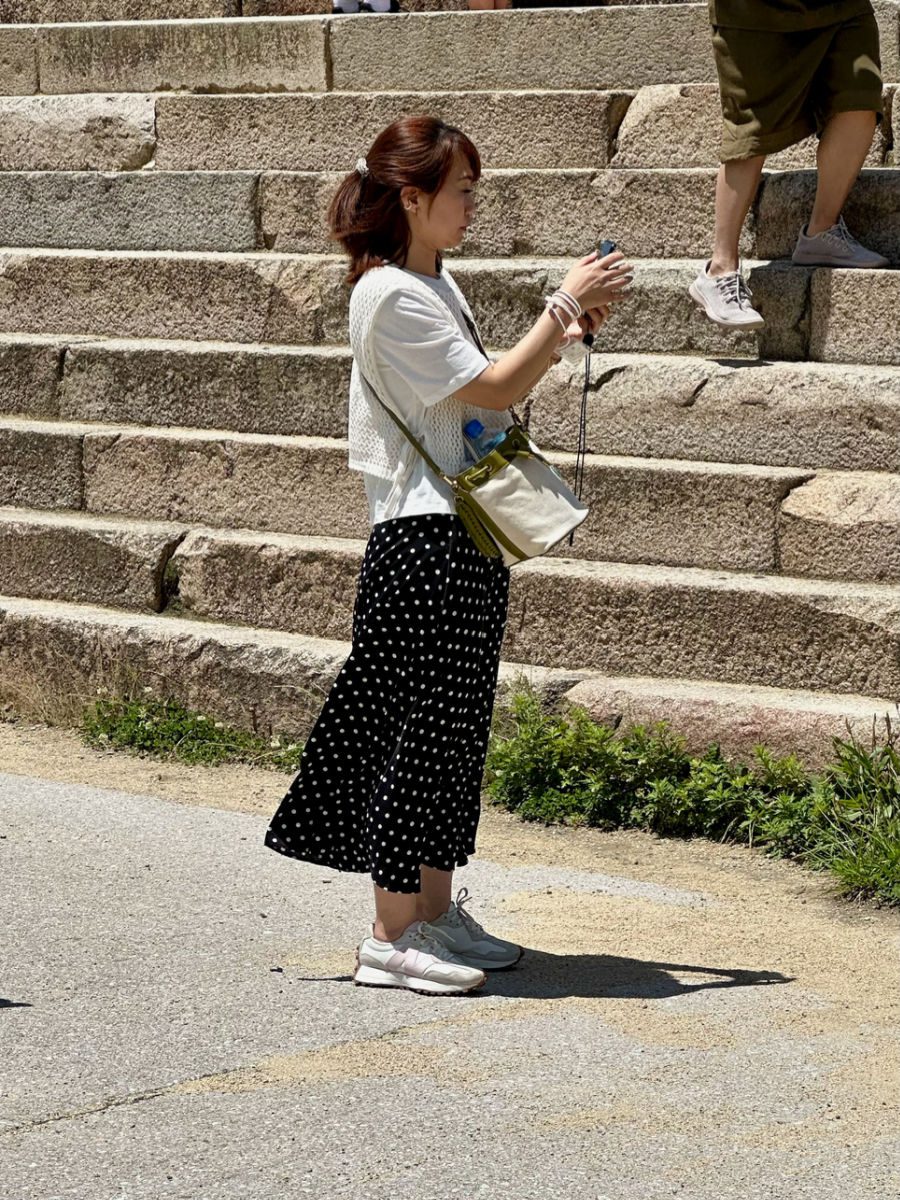
What to Wear in Japan
Japan is a fairly conservative society when it comes to dress, with the exception of the “kawaii culture” amongst the youth. To fit in and show the proper respect, it is important to keep a few tips in mind:
- When visiting temples and shrines, it is appropriate to make sure the knees and shoulders are covered, although it isn’t policed as strictly as some churches in Italy.
- Shorts are rarely worn by locals. You are more apt to see shorts on international tourists in Kyoto than in the big working cities like Tokyo.
- Women wear a lot of loose fitting, wide leg pants and long skirts, paired with a t-shirt under a sweater or flowy button-up shirt or light jacket.
- Men are often in suits or business attire, or slacks and a golf shirt. Younger teen boys will likely wear jeans and t-shirts.
- If you are visiting temples and shrines, or traditional restaurants, it is helpful to wear shoes that can easily be slipped off, as required upon entry.
- When visiting Japan, it is important to wear comfortable shoes, as you will do a lot of walking.
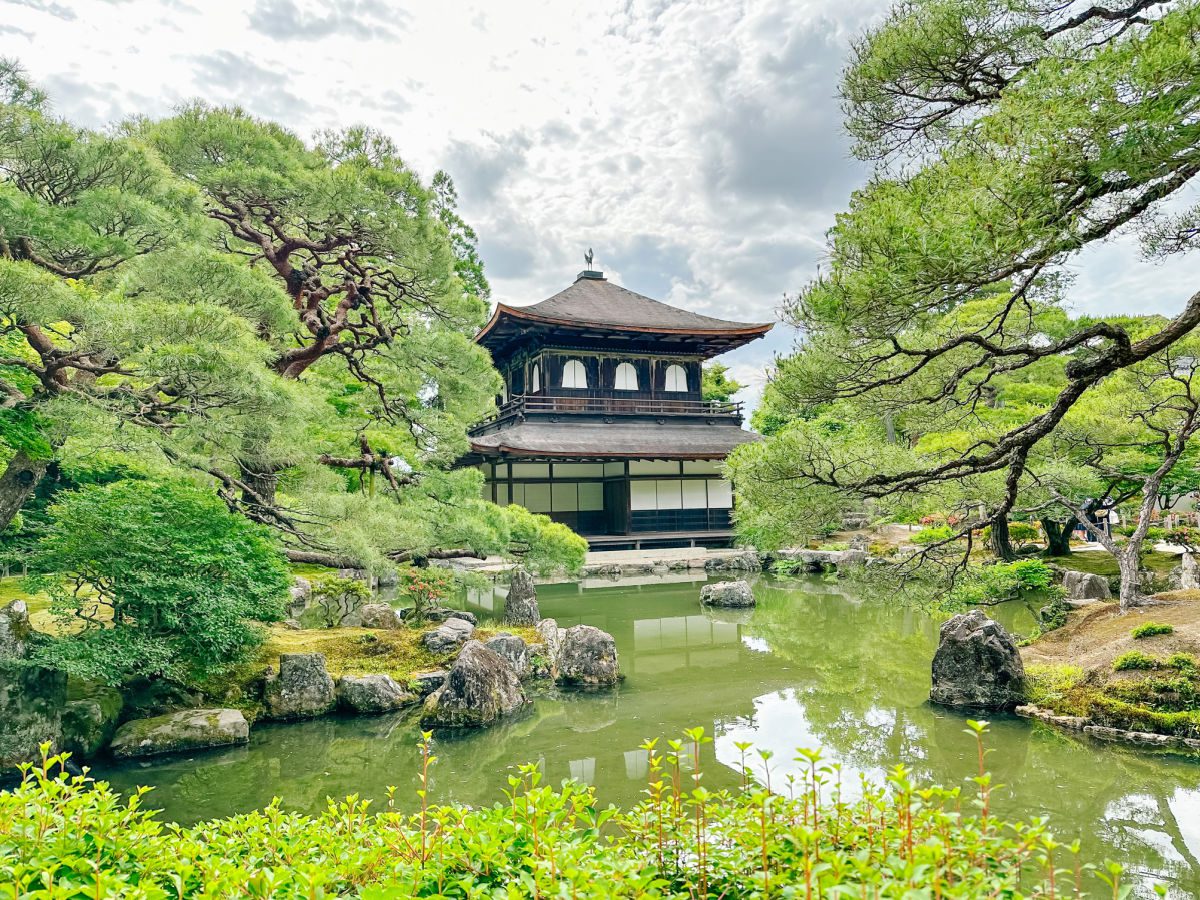
Japanese Culture Tips
The Japanese culture values politeness, cleanliness, order, following the rules, and beautiful presentation. You will see these reflected during your visit and it is important to show respect by observing cultural norms.
- Konnichiwa – hello
- Arigatou gozaimasu – thank you very much
- Sumimasen – excuse me
- Dō itashimashite – you’re welcome
- Hai – yes
- Lie – no
- Gomen’nasai – I’m sorry
- Ohayō – good morning
- Konbanwa – good evening
- O-yasumi nasai – good night
- Japanese packaging may seem excessive or wasteful, but it is very culturally important to present things beautifully. Your purchases will be wrapped and bags sealed with stickers to keep them closed. If you purchase a pastry at a shop, it is often individually boxed with small ice packs to keep it fresh until you can enjoy it at home.
- If you are invited to someone’s home, remember to bring a gift that is nicely packaged.
- A slight bow is a show of respect when meeting someone or thanking them.
- If someone hands you a business card or a gift, except it with two hands and a slight bow.
- Do not blow your nose in public.
- Wear a face mask if you aren’t feeling well.
- Wait to cross the street only when the light is green, even if no one is coming.
- Be on time!! No one is late in Japan, they are usually early. On one tour, our tour guide was being generous by agreeing to wait until 2 minutes after the meeting time for someone that hadn’t yet showed up.
- In Japan, Buddhist temples and Shinto shrines often sit side by side. When visiting, remember to remove your shoes before entering the inside of a temple or shrine (there are usually cubbies provided). At a shinto shrine, it is appropriate to wash your hands first. If you want to offer a prayer, first you bow, then give an offering of small change, bow deeply twice, ring the bell, clap twice, offer your prayer, then bow once more. See a full description of temple and shrine etiquette .
- Remove your shoes when entering a shrine, temple, restaurant with tatami mats, or someone’s home.
- In Japan, public restrooms are widely available and they are very clean. Japanese toilets are also the best, offering features like heated seats, privacy sounds, and washing options. Many public restrooms also offer baby seats in some stalls, along with family bathrooms, changing tables, and nursing rooms.
- Japan is one of the safest countries to visit and even if you are traveling solo, you will feel very comfortable walking around even at night.
I hope these Japan travel tips are helpful. As a travel blogger, I have visited many countries but I found Japan one of the safest, most comfortable, and most orderly place I have been to. It suited my type A personality perfectly and I loved the blend of ultra modern and traditional culture.
Save this to Pinterest
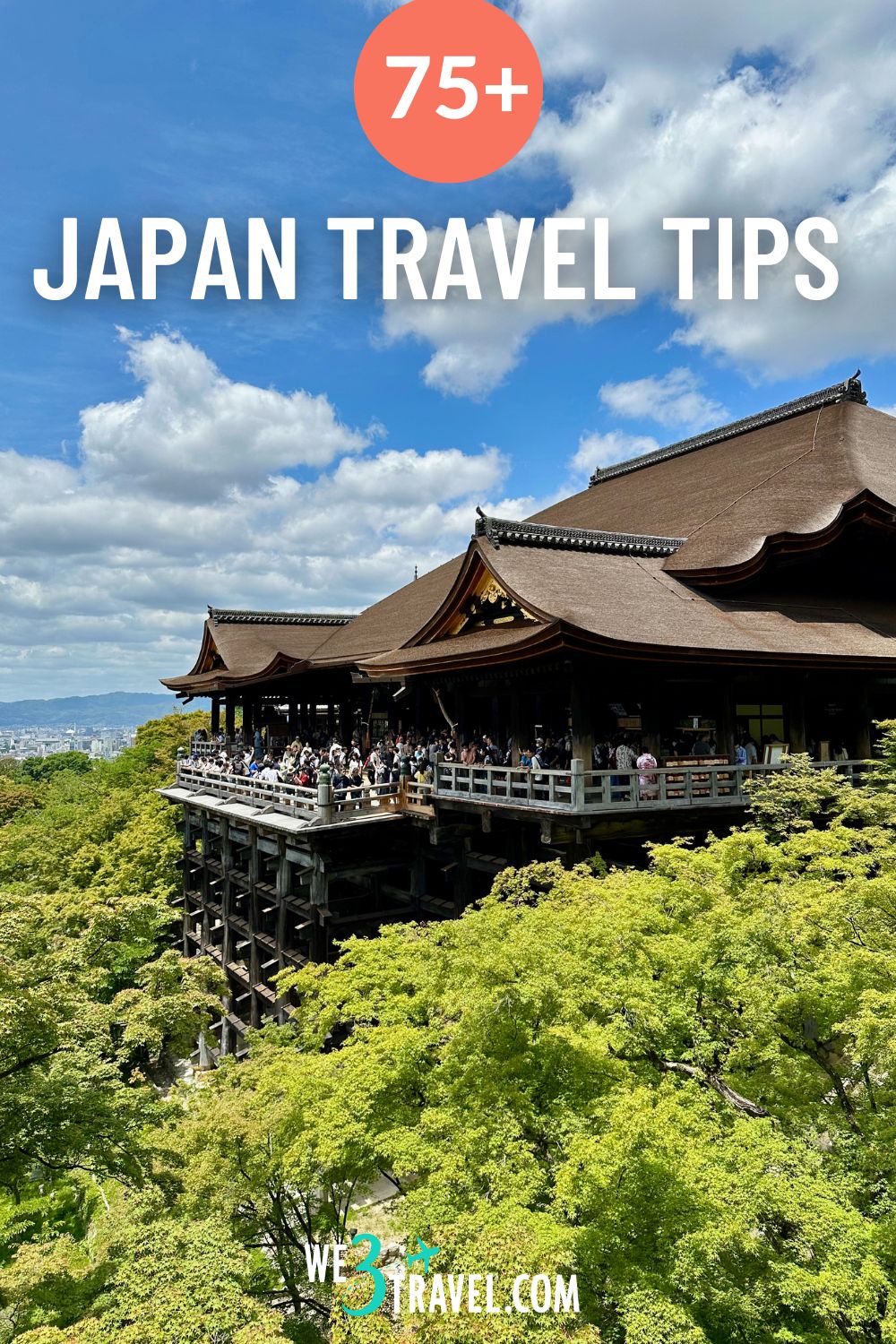
Tamara Gruber is the Founder and Publisher of We3Travel. A former marketing executive and travel advisor, Tamara is an award-winning travel writer and recognized expert in family travel. Tamara is a member of SATW and the Adventure Travel Trade Association, and serves on the Board of the Family Travel Association. She is also the publisher of YourTimetoFly.com and the co-host of the Vacation Mavens travel podcast.
Find this useful? Share it!
Publish Date: May 27, 2024

SIGN UP FOR OUR NEWSLETTER & RECEIVE A FAMILY VACATION PLANNING KIT!
We3Travel.com will use the information you provide on this form to send you newsletters. You can unsubscribe at any time by clicking the link in the footer of any email you receive from us, or by contacting [email protected] . By clicking below, you agree that we may process your information in accordance with these terms.

Start typing and press enter to search
🚚 Free US shipping on orders $150+
Large selection of high-quality products
⚡️ Save more by signing in to your account
Planning A Trip to Japan: The Smart Traveler’s Guide
- Author: Ari Black
Japan has become one of the most popular travel destinations in the world recently – and deservedly so!
Long before the coronavirus pandemic put a hard pause on global travel, Japan was already well on its way to becoming a travel hotspot. The post-pandemic travel resurgence came with a confluence of the Japanese Yen hitting multi-decade lows – as well as soaring interest in Japanese food, culture, history and more. As such, Japan has been beckoning for millions of eager travelers from countries near and far.
A trip to Japan will reward the savvy traveler many times over, not only during the Japan travel experience itself but for a long time afterwards.
What’s the best way to make the most of traveling to Japan?
The answer to that question, as it is for nearly all travel endeavors, is one word:
Planning .
Planning your travels to Japan can be an exciting journey in itself. Moreover, good planning helps ensure that you get not only the best bang for your buck in travel to Japan, but come home with the best memories of Japan travel experiences that you'll treasure for a lifetime.
Here at Japanese Taste, we are thrilled that so many travelers get to experience this wonderful country. As such, it’s our pleasure to be your travel planning companion. We’re here to offer insights and tips to help you plan the perfect trip to Japan. Whether you're a first-time visitor or returning to explore more, we've got you covered, so let's dive in and start planning that Japanese adventure!
When To Start Planning Your Trip To Japan
Travel planning for a destination starts as soon as the idea pops into your head.
Whether you're an aficionado of Japanese food, a fan of anime or manga, or a curious traveler looking to explore more of Japanese society, culture and history, you really can't go wrong with a trip to Japan.
Maybe you’re reading this article after booking flights to Japan, or perhaps you're still thinking about when and where to go. In either case, planning a trip to Japan is best done with some thoughtful consideration and advance planning.
Ideally, one would start planning a trip to Japan several months before departure, especially if traveling during peak seasons such as cherry blossom season (late March / early April) or the autumn foliage season (early November to early December). This allows you to secure the best flights and accommodations, which can fill up quickly during these popular times.
After booking, it’s time to enjoy the planning process over a span of weeks or months, choosing the experiences and places that would best fill your holiday and fulfill your Japan travel desires. Of course, there is a vast array of information out there regarding Japan travel, and sometimes it might seem like overload. That's why it's good to start planning early, plan gradually every day; put it aside sometimes, and then come back to the planning with a fresh mind again.
Regardless of how much time you have between now and your departure date to Japan, why not get organized and plan out your journey to make the most of your Japan travel experience?!
Last-Minute Travel to Japan
In some cases, you may be able to find “deals” by booking last-minute flights. Keep in mind that this approach requires either luck (if you want to go soon) or flexibility (if you’re willing to wait and see) – and thus may not be suitable for everyone.
If you're not going to Japan during one of the peak travel periods (see below for details), a good deal on airfare at a relatively last minute can be rewarding. This will probably require some flexibility for your accommodations, certainly in Kyoto and likely within Tokyo and Osaka as well. But a lucrative airfare might be too good to pass up, so just know that the “deal” you found might be offset with more expensive hotels/lodging – and/or the need to be more “creative” in where and how you stay within Japan.
When Is The Best Time To Visit Japan?

Deciding when to visit Japan depends on your preferences and interests. The most popular times to visit Japan are during the spring (March to May) and fall (September to November).
However, each season offers its own unique charm – as well as certain challenges that the traveler should keep in mind.
Winter: Off-Season Japan Travel Has Its Rewards
With the exception of a few dates around New Year's, winter travel in Japan can be a highly rewarding experience.
That's because the majority of travelers tend to visit Japan in the spring and fall months. But compared to winter in much of the US and Canada or the UK, for example, winter in central, western and southern Japan (home to most popular tourist destinations) tends to be relatively mild.
If you're willing to pack a sweater or two and possibly endure some cooler temperatures, Japan will greet you with trade-offs that include lower hotel rates and tourist sites that are far less crowded compared to the peak travel periods.
It’s worth noting that for January 1 and several days afterwards, many stores and restaurants in Japan will be closed as part of a national holiday. During this first week of January, you're still likely to find some things open in the most touristy areas, but will probably encounter shuttered establishments the further you venture off the beaten travel path.
For pretty much the rest of the winter, from early December through early March, you'll be rewarded with relatively dry weather and fewer tourists, meaning a much more enjoyable experience than visiting during the peak travel periods or the hot, humid summer months.
For those looking to include skiing or winter sports on your Japan travels, both the northern island of Hokkaido as well as the mountains of the Japanese Alps offer a wide variety of experiences and accommodations during the winter months. This can be peak season in some of those places, however, so once again it's best to book ahead and plan accordingly.
Spring & Fall: The Most Popular Seasons for Travel to Japan
As we've noted already, the most popular times to visit Japan are in the spring months and fall months, specifically from March to May and again from October through early December.
The reasons for this include more moderate and comfortable weather, as well as highlights such as the cherry blossoms and the fall foliage.
Sounds like a pretty good time to visit Japan, doesn't it? Well, of course, everyone else looking to visit Japan has pretty much figured this out as well. This puts pressure on demand for flights and accommodations and drives up prices for both. In addition, if you're visiting the major tourist centers of Kyoto, much of Tokyo and certain parts of Osaka, you're likely to be sharing all of the tourist sites with a steady flow of fellow Travelers.
If ideal weather and/or one of the aforementioned festivals are the major reasons for your visit to Japan, there’s plenty of merit to travel during spring and fall. But if you're someone who likes to avoid the crowds and take advantage of some bargains, traveling to Japan during the winter might be your best bet.
Summer Travel: Rainy, Humid & Typhoon Seasons in Japan
Summer (June to August) is, in our opinion, the least desirable time to visit Japan.
Don’t take this the wrong way – Japan is always a great travel destination. But Japan is also notorious for summers that can pose some challenges for travelers.
From early June through mid-late July (with slight variation in dates by region and by year), most of Japan goes through what is known as “Tsuyu” or “rainy season.” That's not to say that it rains every minute of every day; but it's worth noting that most Japanese people will leave home on any given day during this season with an umbrella in hand, knowing that at some point during the day it's likely to rain (and rain significantly).
What does this mean for your travels? Well, the study and constant rainfall can make for wet walking conditions if you choose to travel to Japan during this time. If your Japan travel plans call for any major outdoor activities such as hiking, this rainy season can put a damper on that or at least require a backup plan to be in place. Particularly in Kyoto and in Hiroshima, many of these sites are outdoors, such as temples and shrines as well as parks, etc. the rainy season can make travel to these sites quite challenging and less than ideal.
When the rainy season concludes in mid to late july, the temperatures and humidity levels tend to be quite high – all the way through the end of august. How intense is the heat and humidity in Japan? Even people we know from hot, humid places such as the Philippines or India have regularly commented that Japanese summer still feels pretty uncomfortable to them. Again, that's not to say that one shouldn't visit Japan during this time; just know the challenges and make plans to allow for more comfortable travel. That includes staying hydrated throughout the day; wearing cool, comfortable clothing; and not over-planning the itinerary to the point of heat exhaustion.
Also from August through September and into October, Japan experiences a typhoon season. It's hard to predict when or even if a typhoon might pass through Japan, and so to those coming to Japan during this time our advice is to:
- be aware of typhoon season
- stay informed of the weather forecast for the coming days
- have back-up plans and slack in your itinerary so that if a typhoon were to hit Japan during this time, you would be able to adjust your travel plans
On the other hand, accommodation prices can drop a bit during the summer, other than during the Obon festival period (mid-august). It is also considered the shoulder season for international visitors to Japan, with more travelers compared to the winter months but fewer travelers compared to the Cherry Blossom or Fall Foliage times.
If you're traveling with kids or happen to be a teacher whose vacations tend to fall in the summertime, you may be wondering whether to put off or change your Japan travel plans. We wouldn't recommend skipping Japan because of the rainy season, if that's the only time you can visit; just be aware of the potential pitfalls and plan accordingly.
Trip Length: How Long Should One Stay In Japan?

What’s a good amount of time to spend in Japan?
The short answer to this question is “as long as possible!”
Deciding how long to enjoy your travels in Japan depends on your budget and schedule, as well as what you truly want to see and experience.
Many North Americans, for example, have relatively limited vacation time, and often only visit Japan for a week or so. Europeans, blessed with more holiday time, tend to stay a bit longer.
A typical first-time visit to Japan usually lasts around 8 to 12 days. This trip length allows one to explore major cities like Tokyo, Kyoto and Osaka; and then presents possibilities for a few days in other regions (Hiroshima, Kanazawa, Mt. Fuji area, among others). The longer you stay in Japan of course, the more you can experience.
On the other hand, if you're short on time, a week-long trip focusing on one or two cities can still provide a fulfilling experience. Anything less than a week is really not recommended for visitors to Japan, unless you happen to be in a nearby country and aren't impacted as much by flight times and prices (as well as time zones).
Bear in mind that, for those coming to Japan from anywhere outside the Asia Pacific region, jet lag is likely to be a factor. Thus, planning a trip to Japan for a week or less can cause some missed opportunities or fatigue during the first couple of days. This again is another reason to plan a longer trip to Japan, within the parameters of your time and budget of course.
Flights To Japan: The Long & Short Of It

Finding affordable and well-situated flights is important when planning a successful trip to Japan.
Start by using flight comparison websites (such as Google Flights, Kayak, Skyscanner, etc) to compare prices from different airlines. Booking your flight well in advance can also help secure lower fares. If you're flying from Europe or North America to Japan, you might want to consider spending extra for additional legroom in premium economy or business class. Then again, many travelers opt to fly on economy fares and focus more of their budget on accommodations, food and experiences in Japan itself.
The major air gateways for Japan are Narita International Airport (serving Tokyo but an hour away by train) and close-in Tokyo Haneda Airport, as well as Kansai International Airport near Osaka. Many travelers fly into and out of Tokyo, and have to backtrack after visiting Kyoto and/or Osaka. But we recommend using Kansai International Airport (about an hour from Osaka/Kyoto by bus or train) as an inbound or outbound gateway, and then making an “Open Jaw” airfare combined with Tokyo. This can help save both time and money.
For those flying from neighboring countries in Asia, or flying onward to one of those countries as part of a longer itinerary, other airports in Japan with international service to Asia include Nagoya, Fukuoka, Sapporo and Sendai.
Accommodations In Japan: From Hotels To Inns & Local Stays

Once you've booked your flight, it's time to start thinking about accommodations.
Deciding where to stay in Japan is an important part of the trip planning process. Japan offers a variety of accommodation options to suit every budget and travel style.
If you're looking for a unique experience, consider staying in a traditional Japanese ryokan. These traditional inns offer a glimpse into Japan's rich cultural heritage, with tatami (straw mat) floors, local cuisine and more personalized service. Many ryokan feature “onsen” (hot spring baths), either in the room and/or in communal areas of the property.
For those seeking more “standard” lodging, Japan has a wide range of hotels to choose from, from budget-friendly options to luxury hotels. When planning your accommodations, of course budget will be a factor, but also consider where you want to be during the daytime. This can be a considerable factor in a big city such as Tokyo, as you won't want to be spending too much of your time going back and forth on trains or by foot between sites and your accommodation. For those staying in Tokyo for more than a few days, it can even be worth splitting up your stay in two different locations within the city.
While online travel agencies (OTAs) like Expedia or Booking.com offer decent hotel prices, be sure to read all the details. Often these hotel deals come with penalties for cancellation, or are altogether non-refundable. Many travelers have found that booking directly with the hotel or inn offers better control of the booking, along with better service and more perks.
Gems Of Japanese Cuisine: Meals Are A Travel Highlight!

One of the highlights of any trip to Japan is the food.
Japanese cuisine is known for its fresh ingredients, meticulous presentation and unique flavors. Beyond the favorites of sushi, ramen and tempura, there's something for every palate in Japan.
When planning your dining experiences in Japan, why not try a variety of regional and local offerings, from casual izakaya (pubs) to Michelin-starred establishments. Be sure to also explore markets and street food stalls for a true taste of authentic Japanese food.
Nowadays, many Travelers take advantage of Google Maps and other review sites such as TripAdvisor or Yelp. When looking at reviews of restaurants in Japan, especially those that are outside the major tourist areas, it's important to understand the Japanese rating scale. A 3.5-star restaurant in North America, for example, is often avoided by many in the know. But 3.5 stars in Japan can get you a very good (and locally authentic) meal at a great price – without the wait time of the most popular restaurants in cities such as Tokyo and Kyoto.
Here’s some more food inspiration for your Japan travels:
- Where to eat ramen in Japan
- Conveyor belt sushi
- Kaiseki fine dining
- Okonomiyaki
- Top 10 Takoyaki in Osaka
- Soba noodle guide
- 50 must-try dishes in Japan
- Buddhist vegan cuisine
Some restaurants, especially those in Tokyo and Kyoto, require reservations in advance. Thus, it's best to plan your travels around the restaurants that you don't want to miss. If you happen to show up at a restaurant that appears to be half empty and are told that they are full, it's best to assume that they have reservations taken for the rest of the evening and can't accommodate you. On the other hand, a simple glance at nearby restaurants on Google Maps will find you plenty of good food.
Destinations Within Japan: Cities & Regions

Japan offers a wealth of destinations to explore, each with its own unique attractions and charm.
For first-time visitors, popular cities like Tokyo, Kyoto and Osaka are at the top of the list. Especially if you only have a week in Japan, you can travel on what's known as the golden root and experience these three cities, or at least the highlights thereof, to get a good taste and feel for Japan.
On the other hand, nearly every other fellow traveler to Japan will look to include Kyoto and Tokyo on their itinerary, putting pressure on crowd density, accommodation prices, restaurant availability and transportation options.
Kyoto and Tokyo are not to be missed, especially for the first-time visitor to Japan. If you're returning to Japan for a second or third visit, or are staying for longer than a week, look at other destinations such as Kanazawa, Hiroshima, Hokkaido and/or Kyushu. Here you’ll be rewarded with fewer crowds and more “ground level” travel experiences.
For more on destinations in Japan, check out some of our other articles:
- Autumn Leaves in Tokyo
- Matcha Cafes in Kyoto
- Onsens throughout Japan
- Underrated Nagoya
- Cherry Blossoms in Tokyo
- Japan Cherry Blossom Guide
- Hiroshima & Miyajima
- Eats in Hokkaido
These are just some of the many destinations, regions and experiences waiting for you in Japan!
Public Transportation In Japan: Bullet Trains, Local Trains, Buses & More

Getting around Japan is easy thanks to its efficient and extensive public transportation system.
The Shinkansen, or bullet train, is a fast and convenient way to travel between major cities, while local trains and buses are ideal for exploring smaller towns and villages.
Consider purchasing a Japan Rail Pass if you plan to travel long distances by train. This pass allows for unlimited travel on JR trains (except for the fastest express services) for a set period of time. The pass can save you money if you plan to take multiple train journeys. The Japan Rail Pass has seen price increases recently, and it does not allow for travel on the fastest Sakura & Hikari trains (there are also fare add-ons for the express Nozomi and Mizuho trains). That's why many travelers opt for point-to-point train tickets, enabling them to travel faster between cities and not feel the pressure of having to “get the best bang for the buck” from the JR Pass (as some travelers seemingly feel the need to do, zig-zagging around Japan and spending more time on trains than in cities).
Prepaid cards, such as the Suica or Icoca card, allow convenient access to trains and buses in major cities. These cards can be used on most forms of public transportation and make travel more convenient than buying individual tickets. Many prepaid cards can be used with Apple Wallet or other smart phones.
Apps For Traveling In Japan
Several useful apps and platforms can enhance your Japan travel experience.
Google Maps is a valuable tool for navigating public transportation (including train schedules) and finding nearby attractions and restaurants.
For language translation, many travelers take advantage of apps such as Google Translate or iTranslate, which can help you communicate with locals and understand signs and menus in Japanese.
As of this article’s publish date, TripAdvisor has been losing some of its luster, while the travel forums of Reddit have gained favor. Reddit’s r/japantravel , for example, has a wealth of information in its pinned FAQs, and offers visitors to Japan the opportunity to ask, answer and research all sorts of topics related to Japan Travel.
YouTube has a breadth and depth of content related to Japan travel. Some entertaining and useful channels include:
- Only in Japan * GO
- Abroad in Japan
- Solo Travel Japan
- Rion Ishida
Social media giants TikTok and Instagram are quite helpful for Japan travel planning. Here you can get great ideas for destinations, sites, experiences, food and much more. Social media can, however, have a downside of causing FOMO (fear of missing out); it has also led to an unintended side effect of making too many international visitors look like wannabe-influencers, always looking at their phones (both screen and lens). Our recommendation: Utilize TikTok & Instagram wisely to get some great information and inspiration; then enjoy your time in Japan without getting too hung up on it!
What To Pack For Your Japan Travels

When packing for your trip to Japan, think about the season and the activities you plan to do.
In general, pack comfortable and sturdy shoes for walking, as you'll likely be exploring a lot on foot. If you're traveling during the spring or fall, pack layers as the weather can be variable.
If visiting in the hot, humid summer months, be sure to have enough change of clothes, and include cool fabrics, especially those with moisture-wicking properties.
With that said, don’t overpack! The less you carry, the easier you’ll be able to move around.
And if you happen to forget something, chances are it will be readily available in Japan (a shopper’s paradise!). Also, leave some room in the suitcase for souvenirs to take home!
Money Matters: While Cash Is Still King, Credit Is Picking Up
Japan is still largely a cash-based society, so it's a good idea to carry some cash with you. ATMs are widely available, but can vary in their fees as well as hours.
Credit cards are accepted at hotels, many shops and some restaurants, especially in major cities. Nonetheless, it's best to have some cash on hand. Note that Japan is one of the safest countries in the world, and carrying cash is not considered risky by local Japanese people. (Having said that, crime is not nonexistent; just use street-smarts and be aware of your surroundings)
Mobile payment apps like Apple Pay and Google Pay are also becoming more popular in Japan and can be used at many stores and restaurants.
Dos And Don'ts In Japan: How To Be A Smart Traveler

When visiting Japan, it's important to be aware of and respectful of the local customs and etiquette. Here are a few dos and don'ts to keep in mind:
- Do take off your shoes when entering someone's home or certain traditional establishments like ryokans
- Do be mindful of noise levels in public places, as loud talking or excessive noise is considered rude
- Do try to speak some basic Japanese phrases , as it's appreciated by locals
- Do bow when greeting someone, especially in formal settings
- Don't tip in Japan, as it's not customary (and it’s frowned upon)
- Don’t be one of “those foreigners” – think of yourself an ambassador of your country, and show the best (not the worst) for Japanese to see
- Don’t expect Japan to be “like home” – whatever might seem ‘different’ or ‘unusual,’ it’s best to appreciate & embrace the differences that cultures can have
- Don’t try to “do it all” – Japan has a wealth of travel experiences to be had, but it’s impossible to see and do everything on one experience; spend less time worried about FOMO and more time focused on enjoying the moment (knowing that Japan will be here for you to come back again to see more someday)
By being mindful of these cultural norms, you'll show respect for the local culture and make your trip more enjoyable for both you and the locals.
What Should You Book Ahead For Your Japan Trip?
Booking ahead for your Japan trip can help ensure a smooth and enjoyable experience. Here are some things you should consider booking in advance:
Booking your flights early can help you secure the best deals, especially if you're traveling during peak seasons.
Accommodations
Popular hotels and ryokans can fill up quickly, so it's a good idea to book your accommodations in advance, especially if you're traveling during peak seasons.
Train Tickets
Bullet trains (shinkansen) and other long distance trains can be a hop-on type of situation on some routes and times. However, it’s best to book ahead for peak dates and times; and for peace of mind (for those who are so inclined).
Tickets for Attractions
Some popular attractions in Japan, such as museums and theme parks (Ghibli Park, Tokyo Disney, Universal Studios) are best experienced with advance booking. Be sure to check the website of the attraction you plan to visit for booking information.
Pocket Wi-Fi
Renting a pocket Wi-Fi device can provide you with reliable internet access during your trip. It's a good idea to book this in advance to ensure availability.
Restaurants
Many restaurants in Japan, especially the local eateries, don’t require reservations. However, even popular local spots are best reserved ahead of time if dining on a Friday or Saturday night. For popular restaurants in tourist areas of Kyoto and Tokyo, especially those of the Michelin or similar caliber, advance booking is strongly recommended (and often required).
Enjoy Your Japan Travels – And Your Travel Planning!

Planning a trip to Japan is an exciting and rewarding experience.
By thinking ahead of time about where to stay, what to see and how to get around, you can ensure a smooth and enjoyable journey.
Whether you're exploring the bustling streets of Tokyo, taking in the history and beauty of Kyoto or relaxing in a traditional hot spring in Hakone, Japan offers a wealth of experiences for every traveler. It’s all here for you to plan out your travels, then come enjoy when it’s travel time!
In the meantime, enjoy your Japan travel planning, and do let us know if you have any questions or suggestions!
About the author
Leave a comment.
Please note, comments must be approved before they are published
Stay in touch
Subscribe to get Japanese Taste stories and news delivered to your inbox.

Your cart is currently empty!
4th Day of UAE Study Tour
The delegation had great honor to visit Mohammed bin Rashid Space Center of Dubai. Mr Rashed Bumelha kindly guided us to its esteemed facilities and explained the great achievements of UAE space history. In the afternoon, the delegates went to Al Ain to know the life of inner desert of UAE. They visited Al Ain…
3rd Day of UAE Study Tour
The Japanese delegation has visited Kalba to know the lifestyle of the UAE’s East Coast. Japan Center’s language learners also joined the tour. They enjoyed the cultural exchange as well as the conversation over the various topics during the long bus ride. For some people, it is the first time to visit East coast, no…
2nd day of UAE Study Tour
The participants of “UAE Study Tour” visited Sharjah Museum of Islamic Civilization on May 4th. They were impressed with the great works of Islamic Scientists. Then they joined the Japan Center’s Japanese Language Course. The students of Elementary1 A2 and Starter A1 course enjoyed the conversation with the participants. After this, the participants went home-visit…
UAE Study Tour kicked off on May 3rd
“UAE Study Tour” to study about UAE people and its society started on May 3rd. Semi Government Entity “Center for International Youth Exchange” of Japan, and “UAE-Japan Cultural Center” created 1st Study Tour of UAE for Japanese Youths. The tour will continue till May 8th, visiting Mhd bin Rashid Space Agency, Sharjah Museum of Islamic…
2nd class of National Study is “Emirate Foods”
Ms Sara explained Japanese ladies about Emirati Foods on May 1st. There were so many traditional Emirati foods, which are made by knowledge and experiences of how to keep the foods safe and longer under this hash weather. Those genuine products smell delicious and look healthy. Japanese ladies enjoyed tasting many traditional foods, thanks to…
Arabic Art Course “Madhan” on April 29th
On April 29th, Japan Center held Arabic Art Course for Japanese ladies. Ms. Rania, an art teacher of Dubai Women’s Association, taught how to decorate Madhan with Arabic Design. Japanese ladies enjoyed so much and the time was extended for 2 & 1/2 hours!
National Study Course for Japanese Ladies “Emirati Protocol”
Japan Center started the “National Study” course on April 24th. This is a part of the Arabic Cultural Course for Japanese residents to learn UAE culture. Ms Sara Ahmed from Dubai is a lecturer for this course. The Theme of the first day was “Emirati Protocol”.
Japanese Language Course Term 3 started April 13
Term 3 of Japanese Language Course 2023-24 started on April 13th. There are 2 courses: Starter A1 and Elementary1-A2. In cooperation with Art For All Center Sharjah, more than 15 students from all over the Emirates studying Japanese. It will continue till the middle of June.
21 people participated in Japan Center Iftar Gathering for 2024
The Japan-UAE Cultural Center has recently organized an Iftar gathering for language learners and Japanese residents to enjoy a cultural exchange session in the spirit of Ramdan. As many as 21 people participated in the event that took place in a restaurant in Sharjah, yesterday (4th of April). It is part of the continuous effort…
Japanese Language Course Term3
Japan Center is happy to announce the Term 3 of Japanese Language Course. It will start right after Ramadan on April 13th, so do not hesitate to register now. (We order your textbooks from Japan) The detail is as below: Course: Starter A1 (First Half, Lesson 1 to 9) Date : April 13th to June…
Hello, what can we help you find today?
Consider browsing by category:, popular topics.
- Programs & Resources for Students (external link)
- Request your official Stanford transcript (external link)
- Potential COVID Exposures on Campus (external link)
- Alumni Membership Card (external link)
- Stanford Alumni Email
Contact Information
- SAA Customer Service (external link)
- Stanford University Contact Information (external link)
- SAA Departments
/f/103430/3484x2362/d5c7ff1ada/naoshima-island-japan.jpg)
Take in the beauty of Japan’s temples and gardens, experience traditional Japanese living at a contemporary ryokan, and explore contemporary art on Naoshima Island.
Lessons in art, history, and culture
When we designed this itinerary more than two decades ago, we set out to showcase both the ancient and the modern; bustling cities and small, rural towns; and legendary sites as well as special locales that few tourists visit. We’ll wander the streets of Uchiko, lined with well-preserved Edo- and Meiji-era residences and merchant houses, and travel to Naoshima Island to explore its magnificent contemporary art museums.
Survey the history of Japan, from the temples of Kyoto to the somber Peace Memorial Park of Hiroshima, and marvel at its exquisite textiles, woodblocks, and ceramics. We spend a night in a traditional ryokan, where sliding papered shoji screens replace doors, and delight in traditional Japanese cuisine throughout our stay.
Minimum age
Ready to go looking for more information, be the first to know when reservations open, have a question for us.
Get in touch with someone at Travel/Study.

IMAGES
VIDEO
COMMENTS
Study Trips by Go! Go! Nihon are your chance to live and study in a Japan for a short time, while experiencing the culture through a range of unique and fun activities. The trips last between two to four weeks and encompass your language lessons, cultural activities, and accommodation. Our Japanese Study Trips are the perfect way to experience ...
Educational travel refers to group tours organized by schools for their students with faculty members as group leaders. These trips have clear learning objectives and usually include visits to local schools, site visits, hands-on activities, and so much more. Japan has always been a popular destination for overseas educational travel, with its ...
Announcement of Study in Japan official website renewal. 2023/11/21. Events for the people who want to work as Specified Skilled Worker (Immigration Services Agency of Japan) 2023/10/24. Cool Japan Photo Contest for Foreigners 2023. 2023/10/02. JAPAN-UKRAINE UNIVERSITY PATHWAYS 2024 (external link)
Navigate. Located in East Asia, Japan is an island nation that lies on the West Pacific Ocean. With an area of 377,973.89km 2, it is the 62nd largest country in the world. Japan has a population of 123.22 million people, the world's 11th highest, and its GDP of 4.941 trillion US dollars ranks as the 3rd largest in the world (based on Feb. 2021 ...
Explore ancient history and culture as you tour through the shrines, temples, gardens, and brightly lit streets of Japan. Study the unimaginable destruction of the first atomic bomb or learn about samurai and geishas. Discover the Zen Buddhist way, soak up views of Mount Fuji, and experience the buzz of Tokyo.
Group trips to Japan. We organize trips to Japan with one goal in mind: offering the best possible Japanese experience and providing a painless organization process to teachers, institutions and organizations. Our educational and cultural tours are a balanced combination of language learning and activities, in a safe, international environment.
Educational travel refers to group tours organized by schools for their students with faculty members as group leaders. These trips have clear learning objectives and usually include visits to local schools, site visits, hands-on activities, and so much more. Japan has always been a popular destination for overseas educational travel, with its ...
Japan Study TourTrip Insight Provides Educational Tours in Japan Japan is the Best Destination for Study Tours Of all the countries in the world, Japan is one of the most desirable destinations to visit on an educational tour. Whether you are a student, professor, teacher, researcher, business professional, government official, civil servant, artist or other
Japan Beauty Study Tour The beauty study tour is for beauty school students, beauty shop owners and beauty industries. You take lessons and classes about hair, make-up and fashion at one of the biggest beauty and fashion school in Japan. Experience Japanese Culture
Enjoy the vibrant culture of Tokyo with our practical Japanese study tour. Explore the bustling streets and serene temples of this dynamic metropolis while enhancing your language skills and cultural understanding. With a maximum of 12 travelers per tour, enjoy a personalized and intimate experience as you navigate Tokyo with ease. ...
JLPT Study Trip - Winter. 29 days November 3rd 2024. Book by June 3rd and. Get a 15,000 yen discount to celebrate Go! Go! Nihon's 15th anniversary! Tokyo, Japan. Winter 2024. From 448000 ¥.
Study abroad in Tokyo to experience Japanese culture and have the adventure of a lifetime. Explore centuries-old temples, gardens, and castles that are only minutes from ultra-modern skyscrapers, electronics stores, and haute couture fashion centers. Dine on sushi and tempura, attend a sumo match or a baseball game, and learn tea ceremony ...
Overview. Program Dates: October 4-13, 2024. Open to: VIA alumni, family members, and friends. Location: Kyoto, Nara, and Tokyo. Application Deadline: June 30, 2024. Join VIA's Executive Director, Kazutoh Ishida, along with other VIA alumni, family, and friends for a one-of-a-kind study tour in the Kansai and Kanto regions of Japan! Apply.
This is the homepage of the "Virtual Tour for Prospective International Students from Diverse Cultures and Languages" Project, a part of the Top Global University Japan Project of MEXT. The participating institutions are members of Japan Forum for the Internationalization of Universities (JFIU). Keywords: Study in Japan, Education Fair.
Study Tours & Cultural Excursions in Tokyo. ... you can explore Japan on a CIEE study abroad program. What is Tokyo like. Tokyo, although crowded with a population of over 13 million, is regarded as a clean, safe, and exciting city. With a wide variety of shopping and entertainment options across the city, Tokyo is a vibrant city for students ...
Company Profile Company Name Trip Insight Corp. Established 1 July 2008 Licensed Travel Agency / Fukuoka Gov. No.3-775 Operations -Tour planningTrip Insight (Custom Tour and Study Tour in Japan)Fukuoka WalksFukuoka… Read more
The KKC Study Tour to Japan is full of opportunities to: -Interact with Japanese students, -Exchange views with Japanese school teachers, -Discuss with scholars and experts on Japanese society, -Meet business leaders, and. -Enjoy traditional and contemporary Japanese culture. Keizai Koho Center offers the KKC Study Tour to Japan for North ...
Step 2: Understand the Application Process. Each school has its own application process, so make sure you understand what's required for your chosen program. Gather Necessary Documents: Typical documents include academic transcripts, recommendation letters, a personal statement, and proof of Japanese or English proficiency (depending on the ...
Yusuke Yoshizawa. . Services:. ・Consultation for study abroad. ・General support service while staying in Japan. ・Recruiting services. ・Investment in new business with innovation. Address:. Level 32, Shinjuku Nomura Building, 1-26-2 Nishi Shinjuku, Shinjuku-ku, Tokyo 163-0532, Japan.
Japan Forum for Internationalization of Universities (JFIU) Virtual Tour for Prospective International Students from Diverse Cultures and Languages. March 1, 2024 (Fri), 15:00 (Japan Time, UTC+9) March 2, 2024 (Sat), 10:00 (Japan Time, UTC+9) Visit our website for updates https://studyinjapan-jfiu.com. Inquiries: [email protected]
The Japan Study Tour is offered in even-numbered years and, while the itinerary varies from trip to trip, participants can look forward to an astonishing array of authentic experiences in Tokyo, Nikko, and Nagano. Highlights: Highlights of past tours include: visits to major companies such as Canon and Mitsubishi Fuso ; an afternoon of sumo at ...
VS Oceania is an educational services provider that offers quality, education-centric exchange programs. We specialise in facilitating student exchange and study tour programs for Japanese students, where our responsibilities include liaising and coordinating with the host schools and homestay families prior to the student's arrival.. Our team comprises of people that genuinely care about the ...
The study tour has been conducted annually since 2010 by the Ministry of Foreign Affairs with local governments or bodies in order to introduce diverse attractions such as history, culture, tourism, local products, and industries of Japan's regional areas to diplomatic corps in Japan. In this tour, under the theme of "Tour Exploring the ...
Japan Study Tour. FUKUSHIMA PREFECTURE & TOKYO 14-20 January 2024. ( applications now closed) Outline of the Japan Study Tour 2024. This year's tour is hosted by Fukushima Prefecture, on the theme of "Reconstruction and Recovery". Full Theme Title: Reconstruction and Recovery from the 2011 Great East Japan Earthquake and Nuclear Disaster ...
The tour is one example of the many opportunities available through La Trobe Learning Abroad's semester exchange programs. Mila shares her impressions of Japan and how the study tour has impacted her career plans: I was fortunate enough to participate in the Mitsui Educational Foundation's 2023 Japan Study Tour from 21 November to 12 December.
Taking a food tour is a great way to learn about the local cuisine. We took a food tour in Osaka with Arigato Travel and definitely recommend them. What to Wear in Japan. Japan is a fairly conservative society when it comes to dress, with the exception of the "kawaii culture" amongst the youth.
Japan has become one of the most popular travel destinations in the world recently - and deservedly so! Long before the coronavirus pandemic put a hard pause on global travel, Japan was already well on its way to becoming a travel hotspot. The post-pandemic travel resurgence came with a confluence of the Japanese Yen hitting multi-decade lows - as well as soaring interest in Japanese food ...
Customize your tour. Get in touch with the guide to create an itinerary that's the perfect fit and uniquely yours. Discover japan on a private tour with a local tour guide. Book our guided tours in japan now & experience the best things to do in the city.
The participants of "UAE Study Tour" visited Sharjah Museum of Islamic Civilization on May 4th. They were impressed with the great works of Islamic Scientists. Then they joined the Japan Center's Japanese Language Course. The students of Elementary1 A2 and Starter A1 course enjoyed the conversation with the participants.
Japan. Take in the beauty of Japan's temples and gardens, experience traditional Japanese living at a contemporary ryokan, and explore contemporary art on Naoshima Island. ... Get in touch with someone at Travel/Study. Contact us. Subscribe to our emails. Stanford Alumni Association. Frances C. Arrillaga Alumni Center. 326 Galvez Street ...